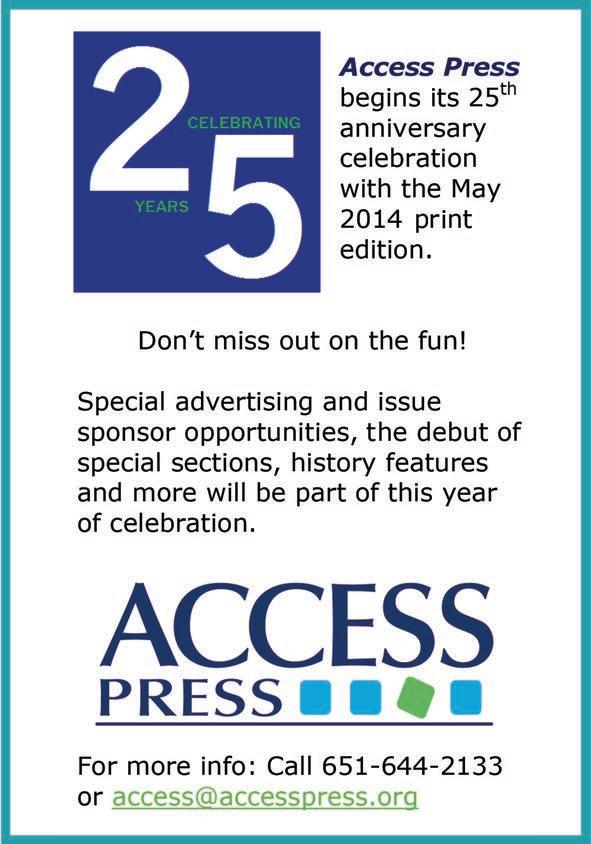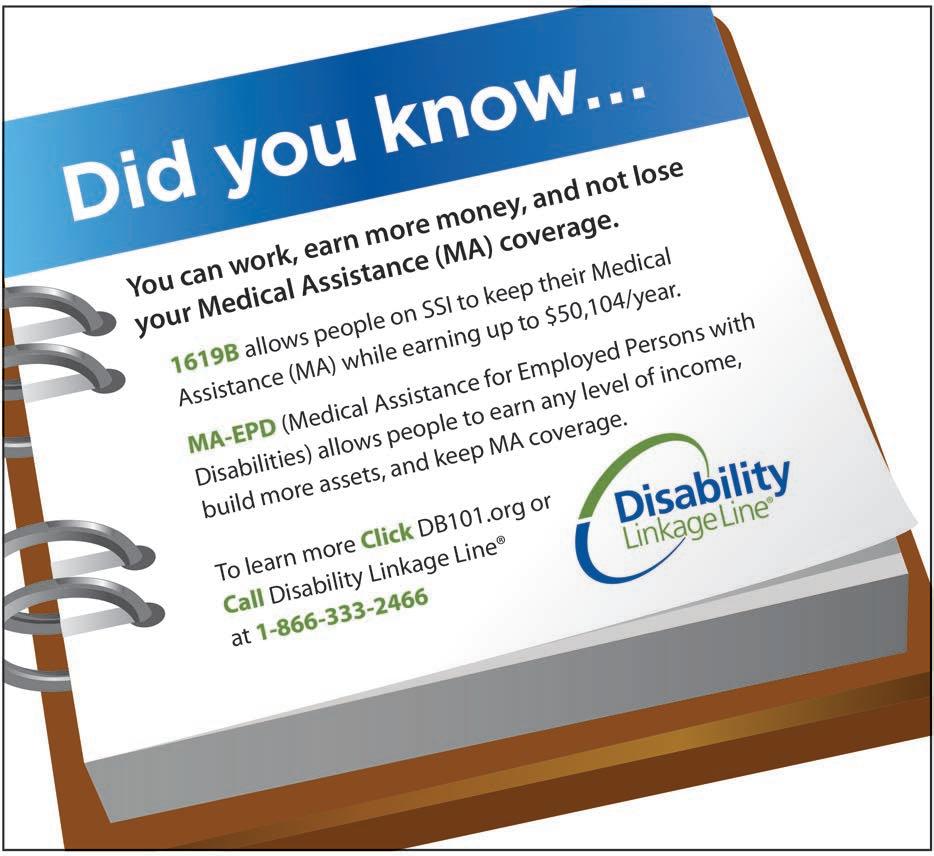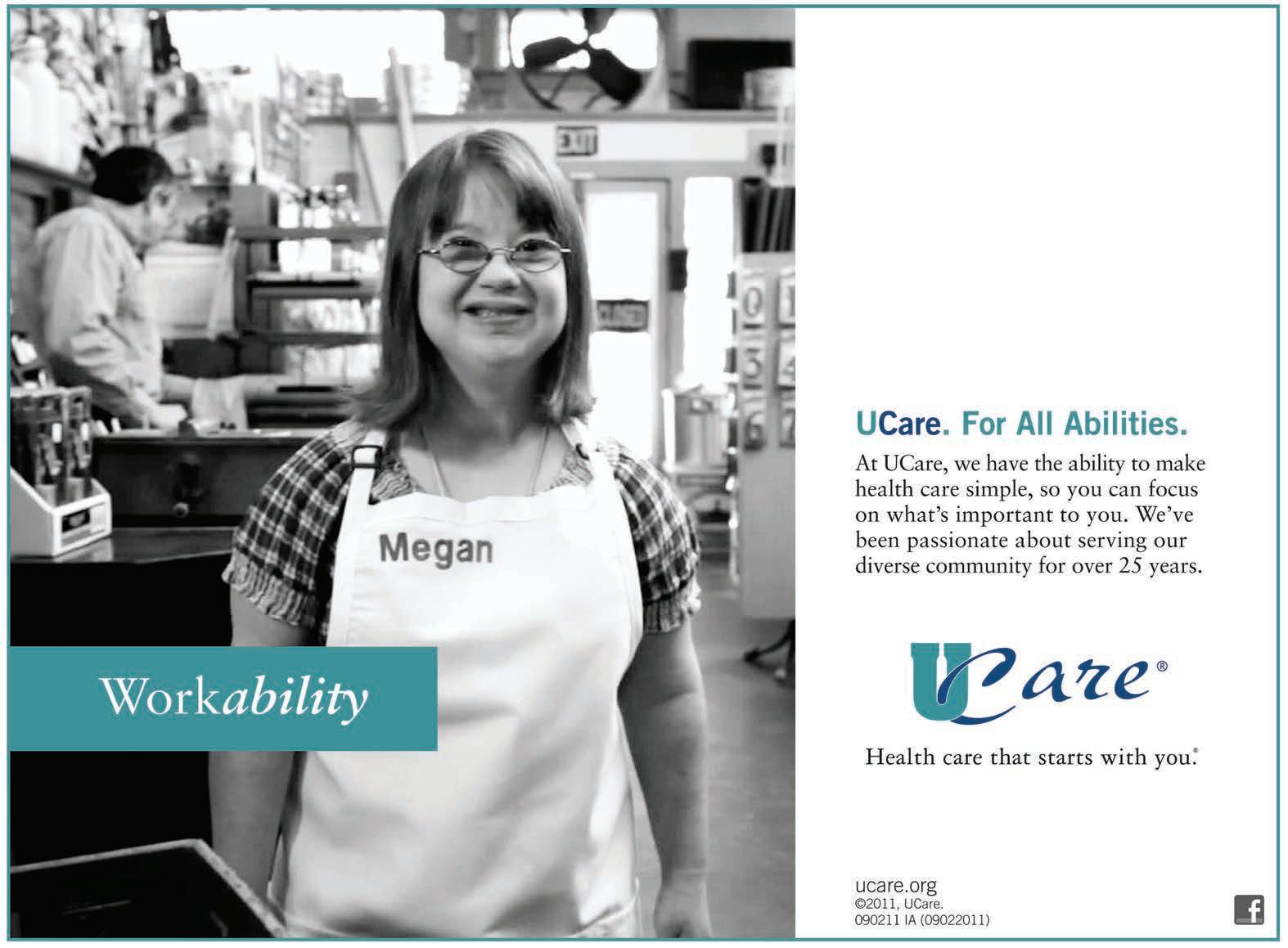
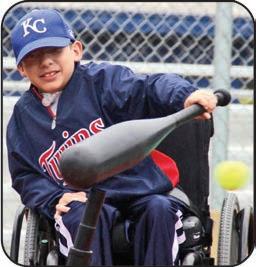



by Access Press staff
by Jane McClure
The state’s upcoming Community First Supports and Services (CFSS) program has had its twists and during the 2014 legislative session. What everyone is waiting for now is to see how the federal Centers for Medicaid and Medicare Services (CMS) will act on Minnesota’s new program.
CFSS will replace Minnesota’s Personal Care Attendant (PCA) Program. Minnesota Department of Human Services (DHS) staff is working on implementing the program change, looking at a number of issues including the definition of “dependency” and what that means for participants. A commentary from DHS on the program appears on page 15.
The changeover was to take place April 1, but it has been pushed back to much later. That’s prompted some Halloween jokes from mem-
The ice has finally melted from many of Minnesota’s lakes and rivers. That not only means spring is here, but that Minnesota’s Polar Bear Plungers may finally be able to feel their fingers and toes. The 17th year of the Polar Bear Plunge wrapped up in March. Statewide, 17,748 volunteer plungers raised more than $3.7 million for Special Olympics Minnesota. Of that amount $1.3 million came from Minneapolis Plunge activities. The event at Lake Calhoun in Minneapolis included a 5K run, adult and peewee children’s plunges, fireworks and other fun events.
Special Olympics Minnesota offers children and adults with intellectual disabilities year-round sports training and competition. While those events rely extensively on volunteers, fundraising is needed so athletes can compete.

Much funding comes from the Polar Bear Plungers, who make their jumps into icy lakes in the name of charity. The number of plunge participants stayed about the same in 2014, said event spokesperson Taylor Dale. But the number of pledges went up. Dale joked that it might be because of the recording-breaking cold winter brought record breaking donations. People may have felt sympathy for the plungers and given more.
The Polar Bear Plunge is the most high-profile of the fundraising events. People repre-
senting organizations, business or just themselves jump into frigid water to support Special Olympics athletes. Many plungers don silly costumes. Bumble bees, fairies, funny critters and even Elvis impersonators take their turns jumping into frigid waters.
The Polar Plunge this year consisted of 16 different events that took place across Minnesota during the coldest months of the year.
by Jane McClure
The 5% Campaign, one of the highest-profile efforts at the 2104 Minnesota Legislature, is close to reaching its goal. But getting the increase close to approval hasn’t been easy. Nor is anything certain until Gov. Mark Dayton approve state spending, including the health and human services budget.
The House approved its budget just before midnight April 3, after more than nine hours’ debate. The budget passed on partisan lines, 70-59, with Republicans decrying it as wasteful spend-
ing. DFLers defended the programs funded, saying they are needed.
The House budget does include the 5 percent rate increase for home- and community-based services for people with disabilities. The Senate, which also includes the 5 percent raise, was expected to pass its budget as Access Press went to press. Those budget details still have to be hammered out and ultimately approved by the governor.
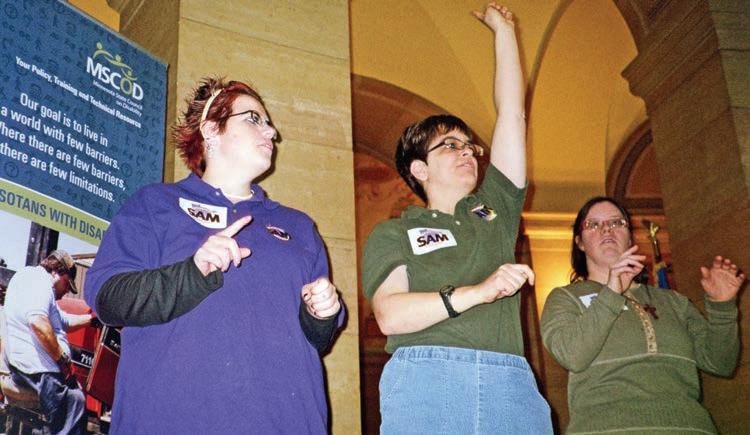
The caregiver wage increase would cost about $84 million a year to implement. It would affect about 91,000 workers statewide, many of whom have been through years of pay cuts. It would also impact the level and quality of care for about 92,500 people with disabilities and elderly Minnesotans who live in the community.
The House budget also includes $2 million for a rate increase for rural nursing homes that pay employees $14 an hour or less. Rural areas have struggled to retain nursing home workers and in some cases, nursing homes themselves.
In 2013 nursing home workers won a rate increase of 5 percent increase for employees’ wages. Those who serve people with disabilities and the elderly got only a 1 percent increase. That slim increase, coupled with years of cuts to home- and community-based care, means wages for those who provide direct care have fallen far behind.
“The secret of success is learning how to use pain and pleasure instead of having pain and pleasure use you. If you do that, you’re in control of your
If you don’t, life controls you.”


Can it be that spring is really here? Only a few days ago I was wondering if this winter would ever end. Who knows? Maybe another snowstorm will leave me stuck at home once again. But I hope by mentioning that, I’ve not jinxed it. Like all Minnesotans this year, I’m truly ready for spring!
We are one step closer to the 5 percent reimbursement rate increase to caregivers and PCA providers. The House of Representatives will be voting on this the second week of April. If you have not talked to your representative about the 5 percent reimbursement, I would encourage you to contact them quickly and explain the need for this increase in compensation. Home- and community-based caregivers have not gotten a wage hike in years, while nursing-home employees got a 5 percent increase just last year. If an independent-living model is really the state’s goal for care, then the home-care agencies and caregivers should have equal compensation. If by the time you read this the 5 percent increase has been passed, send your legislator a thank-you note.
This month we have an exceptionally good History Note. The Minnesota Governor’s Council on Developmental Disabilities, sponsor of the note, has an ex-


traordinarily informative historical website. Knowing the history of the disability rights movement through all its ups and downs is vital to how we advocate today. Also, it’s just really amazing to read and watch videos of the stories behind how we got to where we are, and to admire the insight of the folks that came before us in the movement. I often wonder if young people will take over as advocates to continue the positive direction of the disability rights movement. I’ll bet, though, that the people you read about in these History Notes and on the Governor’s Council’s website wondered the same thing.
We have articles on page 4 that examine the pros and cons of state-supported SCI research and pending legislation. Reading the History Note and visiting the Governor’s Council’s website really reinforced my thoughts on the upcoming research legislation. I hope you’ll read it and share your thoughts.
On page 5 we have an article on the Olmstead plan. I know I’m beginning to sound like a broken record (if you remember records that could sound broken), but I truly believe this is our future. We have to take some initiative and make comments on this plan, because it will determine how the needs of people with disabilities will be served in the years to come. We have printed details on the upcoming information and comment sessions so that you can plan to make your suggestions and concerns known to the people who are putting this plan together.
Community First Supports and Services is another piece of our future that we have to be involved in.
This program could be good for many of us, bad for others; but if we don’t make our voices heard about the problems we see it will be bad for all of us. There are a lot of people at the Department of Human Services who want this to work for us—people who are very compassionate and committed to preserving all the independence the disability community wants. The federal government still has to okay the program plans—even though the state legislature has already assumed in the budget that the federal government will increase its reimbursement rate by six percent. So there is real pressure to get CFSS going and the state receiving the money it’s already budgeted.
There are some interesting new things happening at the Mixed Blood Theater. If you haven’t checked it out lately, you really should. I hope you all recall the theater’s “Radical Hospitality,” which offers free admission and, if you live in the city boundaries, a free taxi ride to the theater and back home. They provide an incredible range of accessibility features. It’s an arts organization that has made extraordinary efforts to be inclusive to everyone. Mixed Blood produces new plays all the time; many stories include a disability angle that’s authentic and well portrayed.
This month we are running our quarterly Access Press’s Directory of Organizations. If you have any suggestions on how we could make it better and more useful to you, please contact us at Access Press with your ideas and comments.
Have a good month and I hope you’ll take my suggestions to call a legislator, check out the Governor’s Council website and have a great time at the theater. ■
American social constructs were dehumanizing for people with disabilities in the decades leading up to the Americans with Disabilities Act (ADA). When looking back at this history, Dr. Wolf Wolfensberger is one of the standouts. His eye for the details, consequences, and ramifications of the origins and evolution of history on the attitudes and perceptions of people with disabilities is widely recognized.
German native Wolfensberger was a professor and director of the Training Institute for Human Service Planning, Leadership and Change Agentry at Syracuse University. He did research and taught at other universities. Much of his work was concerned with ideologies, structures and planning patterns of human service systems, especially concerning people with developmental disabilities and their families. He was the originator of Citizen Advocacy and Social Role Valorization, and the foremost proponent of normalization in North America. Wolfensberger died in 2011 but his work and teachings live on.
The Minnesota Governor’s Council for Developmental Disabilities recently posted video clips in which Wolfensberger chronicles the rise of social justice, compassion, dignity, transformation and em-

Co-Founder/Publisher
Wm. A. Smith, Jr. (1990-1996)
Co-Founder/Publisher/Editor-in-Chief
Charles F. Smith (1990-2001)
Board of Directors
Brigid Alseth, Steve Anderson, John Clark, Kristin Jorenby, Elin Ohlsson, Halle O'Falvey, Carrie Salberg, Cheryl Vander Linden, Walt Seibert and Kay Willshire
Advertising Sales Michelle Hegarty
612-807-1078
Executive Director Tim Benjamin
Managing Editor Jane McClure
powerment from the “profound bankruptcy of vision,” to the “might makes right” power politics of professionals and services in the 1950s through the 1970s. This is part of the ADA Legacy Project. To learn about Wolfensberger and see the clips, go to http:// mn.gov/mnddc/ada-legacy/ada-legacymoment16.html
If it wasn’t for the American normalization movement’s positive influence on the American Civil Rights movement, the Disability Rights movement may have had a very different focus—attempts to improve institutions and segregated places rather than promotion of inclusion and integration in the community.
Wolfensberger describes how the American normalization movement’s influence on education, and indirectly on the legal profession, brought the treatment of people with disabilities out of the programmatic construct and into the legal construct. He noted, however, that this evolution did not come without its own “mischief.”
Wolfensberger had key influence on the federal Developmental Disabilities Assistance and Bill of Rights Act (DD Act). Under former Sen. Lowell Weicker’s (D- Connecticut) leadership, the 1984 amendments to the DD Act preceded the ADA with legislative lan-
Business Manager/Webmaster
Dawn Frederick
Cartoonist Scott Adams
Production Ellen Houghton with Presentation Images
Distribution S. C. Distribution
Editorial submissions and news releases on topics of interest to persons with disabilities, or persons serving those with disabilities, are welcomed. We reserve the right to edit all submissions. Editorial material does not necessarily reflect the view of the editor/publisher of Access Press
Paid advertising is available at rates ranging from $12 to $28 per column inch, depending on size and frequency of run. Classified ads are $14, plus 65 cents per word over 12 words. News, display advertising and classified advertising deadline is routinely the 25th of the month. When the 25 th falls on a weekend, deadline is the next Monday.
Access Press is a monthly tabloid newspaper published for persons with disabilities by Access Press, Ltd. Circulation is 11,000, distributed the 10th of each month through more than 200 locations statewide. Approximately 450 copies are mailed directly to individuals, including political, business, institutional and civic leaders. Subscriptions are available for $30/yr. Low-income, student and bulk subscriptions are available at discounted rates.
Application to mail at Periodicals Postage Prices is Pending at the St. Paul, MN 55121 facility. POSTMASTER: Send address changes to Access Press at 161 St. Anthony Ave, Suite 901, St. Paul, MN 55103.
Inquiries and address changes should be directed to: Access Press; care of The Kelly Inn Offices; 161 St. Anthony Ave; #910; St. Paul, MN 55103; 651-644-2133; Fax: 651-644-2136; email: access@accesspress.org www.accesspress.org
guage that promoted independence, productivity and integration.
The video clips feature other prominent figures discussing Wolfensberger’s influence. One clip features Dr. William Bronston, who led the exposure and class action lawsuit against the State of New York’s infamous Willowbrook State School on Staten Island in 1971. Bronston notes that Wolfenberg asks and gives no quarter in his telling of the history of human services, including the disability rights movement.
Wolfensberger challenges those who may feel they are playing a confident and active role in promoting social justice, compassion, dignity, transformation and empowerment. Wolfensberger’s lessons provide insight on what more needs to be done and what needs to be done differently. He also raises cautions about the perversities associated with the disability rights movement, including the Americans with Disabilities Act. Recognizing how we have fallen short inspires us to do better. ■
The History Note is a monthly column sponsored by the Minnesota Governor’s Council on Developmental Disabilities, www.mnddc.org or www.mncdd.org and www.partnersinpolicymaking.com

by Jane McClure
Self-advocates and organizations for people with disabilities are still monitoring dozens of issues as the 2014 Minnesota Legislature enters its final weeks. Many issues are still in play as state lawmakers approach a May 19 adjournment date. Numerous proposals were still unresolved as Access Press went to press, including additional funding for state academics, jobs funding, action on parental fees, potential Medical Assistance-Employed People with Disabilities program changes and changes that could affect the assets people with disabilities can have.
One high-profile issue that is moving ahead is the Safe and Supportive Schools Act. The anti-bullying legislation was a flashpoint during the 2013 session, with debate including a long and contentious floor session. The bill was tabled in the final hours of session last year, as Republicans threatened a lengthy filibuster to block the bill.
Advocates contend Minnesota’s existing anti-bullying law is one of the weakest in the nation. Many disability organizations and self-advocates lined up to speak for the proposed legislation, saying it would provide badly needed protections. Students with disabilities are among those who would be protected. Opponents contend the bill would be too costly. Estimated costs to implement the bill are at $19 million.
On April 3 the bill passed the Senate 36-31. The Senate added more than a dozen amendments. The bill provides a clearer definition of bullying, allows individual school districts and schools to develop their own anti-bullying policies and requires training for school staff.
Although the House passed the measure last session there were enough changes that it needs to go back to the floor for another debate and vote. Then it would go to Gov. Mark Dayton for his signature. Dayton has said he will sign the bill into law.
Another high-profile effort has been the push to legalize medical marijuana. In early April, Dayton was given a petition with more than 5,000 names, asking that he reconsider his stance on the issue. Dayton has sided with law enforcement against the legalization of medical marijuana. People with a number of medical conditions contend that the issue is one of life and death, and should not be politicized.
Dayton has said he’d like a study of the use of medical marijuana for ill children, but proponents contend that they don’t have time to wait for a study.
Many other issues are still in play. One bill that various disability rights advocates are following would affect students who transfer high schools and how eligibility is determined. If it is passed this session, it is likely to be included in an omnibus bill as it has no companion Senate bill.
Rep. Bob Dettmer (R-Forest Lake) is a teacher and coach who wants to change current Minnesota State High School League rules. Dettmer brought changes forward to help constituents whose son has disabilities.
Transfer students are generally ineligible for varsity competition for one year beginning from the first date of attendance at the new school, unless the student’s parents move from one public school district attendance area to another area. Dettmer wants the league to adopt new rules, so that any student with a disability would be immediately eligible to compete. The disability would be defined by the student having an individualized education program or 504 plan that transfers from one public school to another.
The league and some schools have worried that the transfer law could be
Caregivers could see wage hike approved - from p. 1
Despite starting the session with many legislators signed on to support the 5% Campaign, campaign leaders were concerned that much of the state’s surplus would have to go to meet other needs. In late March the best advocates thought they might do is wrangle out a 4 percent increase.
“We need to keep reminding people that this is the 5% Campaign, not the 4% Campaign,” campaign co-chairman Steve Larson of The Arc Minnesota said at one point.
The push for the 5 percent increase was heard loudly at the March 18 Disability Day at the Capitol. Despite snowstorms that kept many of the Greater Minnesota groups home, a few hundred people filled the capitol rotunda to make themselves heard. They repeatedly shouted “Five percent!” and “Nothing about us without us!”
Up until the House vote there was a strong possibility that the increase would have been 4 percent. At the Disability Day rally, ARRM Executive Director Bruce Nelson drew boos when he said, “Some people have been talking about a 4 percent increase.”
Several lawmakers urged the crowd to keep fighting for the 5 percent increase. “Your voice really does matter in St. Paul,” said Sen. Kent Eken, DFL-Twin Valley. He is chief author of the 5 percent bill in the Senate. Eken, who has a brother with disabilities, urged those present March 18 to stay the course and not give up the push for the 5 percent increase.
“Why is it OK that our workers who care for pour most vulnerable citizens haven’t had a pay increase in six years?” said Sen John Hoffman, DFL-Champlain. “Five percent is a minimum solution for this year,” said Sen. John Marty, DFLRoseville, who wore two buttons from the 5 % Campaign.
The House action takes about $322 million of the state’s $1.2 billion budget surplus. Dayton and lawmakers already earmarked $443 million of the surplus for a package of tax cuts. Another $150 million would be placed in a budget reserve or “rainy day” fund. ■
abused, as students switch schools for competitive purposes. But others have said the law change would provide needed clarity and would help students transfer schools while not losing the ability to play a sport. Several disability groups have lined up to support the proposed change.

Transportation issues are also being watched. One concern raised recently in the House is how new light rail transit vehicles are being designed. The vehicles are more difficult for passengers in wheelchairs or scooters to use, with designated areas and companion seating being replaced by fold-down seats. The folddown seats are often taken by other passengers. Margot Imdieke Cross, an accessibility specialist with the Minnesota State Council on Disability, has been among those presenting testimony about the change.
Rep. Sandra Masin (DFL-Eagan) has sponsored legislation that would require new design standards for future light rail transit vehicles on the Blue Line and soonto-open Green Line rail services. Dedicated wheelchair space and companion seating would be required on each train car. Metro Transit is in support of the change. Another transportation issue moving ahead would expand eligibility for disability vehicle license plates. The bill, also sponsored by Masin, would allow the parents or legal guardians of people with disabilities to qualify for permits. It would also require new language on disability parking space signs. The signs would tell drivers to clearly display disability parking authorization and to park in the center of the space. The bill would require that this information, which is already included in state law, to be added to parking signs. ■
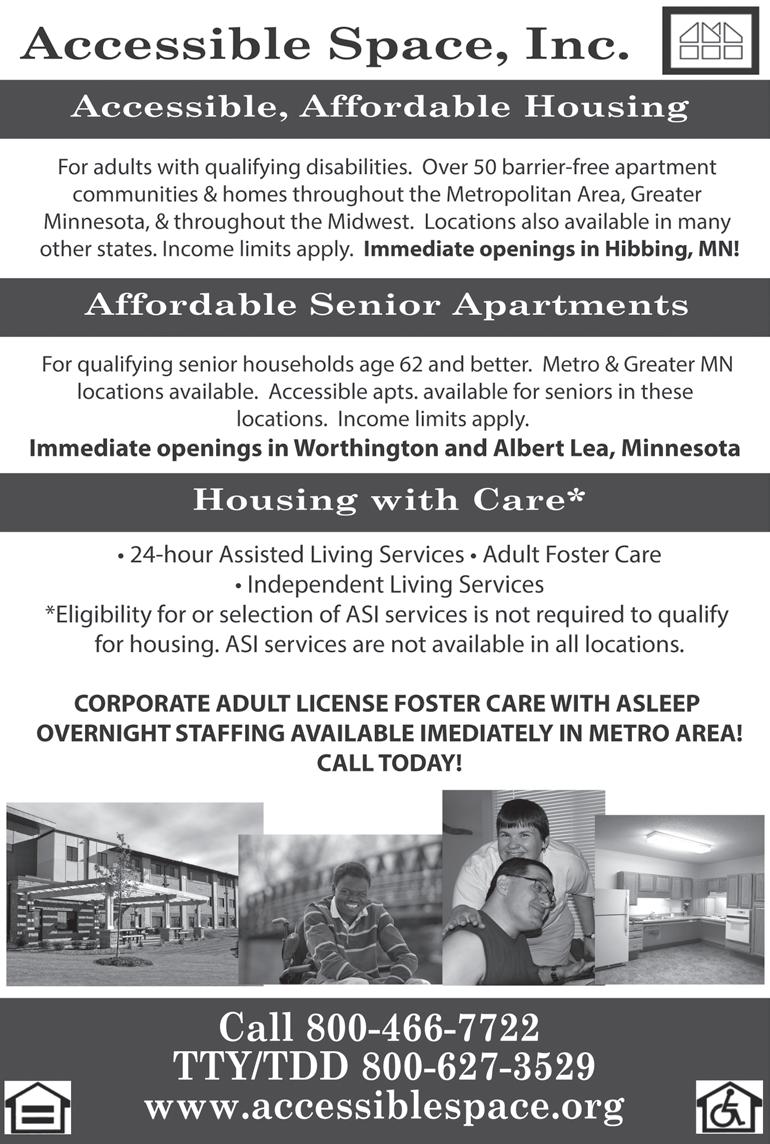

by Matthew Rodreick
After three years of advocating for spinal cord injury research I have come to recognize that there is a delicate balance between idealism and pragmatism. It’s a balance between the world as it is and the world as you believe it should be. This has been a profoundly difficult lesson at the capitol.
For the last two sessions there’s been a small bill that you may or may not have heard of moving through the legislature. The bill is currently referred to as the Spinal Cord Injury/Traumatic Brain (SCI/TBI) Injury Research Fund (Senate File 111). It’s a request for an allocation of $4 million annually to be distributed to research projects in Minnesota.
We have attempted to build a case for this investment by focusing on three things, all of which I believe any group of people afflicted with a disease or injury might make. Firstly, consider the effects of our injury as a humanitarian appeal. Secondly, consider it as investment in creating jobs that would directly benefit the economy while concurrently moving what we would consider necessary research towards mitigating the effects of our injuries. Thirdly, we have suggested that even incremental improvements in function for those living with paralysis would significantly reduce the costs of care (the estimates for SCI/TBI care approach $1 billion annually), which are predominantly the responsibility of the state.
But now, recent developments in a variety of research projects have brought this effort into a more immediate focus. Since this legislation was introduced in the last session, there have been several human clinical trials for the treatment of paralysis, which have shown varying degrees of improvement for the first patient cohorts. Those projects are now looking to expand the number of patients by collaborating with other institutions and Minnesota is on the list of potential sites. We believe that passing this legislation would help to entice those projects here. This would also mean that Minnesotans seeking entrance to these trials would have both a greater chance to participate as well as a keener awareness of the research developments in our backyard.
We know and have been told many times that our chances of passing this bill in this legislative session are very slim. This is where the delicate balance between idealism and pragmatism comes into focus. I have been told that most legislators “want to help” but . . . either we have not made a strong enough case, do not represent enough people, don’t have sufficient political influence or our cause does not directly and positively affect the ledger that our elected officials must manage. This is most directly informed by what is often referred to in our community as the “Care versus Cure” debate, of which I’m guessing most of you are aware.
We do not see a debate, but rather a continuum. Curative research and its eventual therapies are simply ticks along the continuum of providing more comprehensive care. I would suggest that legislators have been most sensitive to advocates who lean more on the pragmatic end of the continuum which has made our cause all the more difficult. While I see the need for more ramps, access and services I don’t believe it requires me to let go of the vision for a world in which their necessity is greatly diminished.
I believe we must live simultaneously in the world as it is and the world as it could or even should be. We will continue to advance our case that for those living with paralysis, the world as it could be will arrive sooner if we start living in it. ■ Matthew Rodreick is the father of Gabe Rodreick. Gabe broke his neck while diving in Costa Rica in 2008 and is a quadriplegic.
by Jeff Bangsberg and Tim Benjamin
The article appearing with this one encourages readers to support Senate File 111, which asks the Minnesota Legislature to annual fund spinal cord and traumatic brain injury research. We disagree.
We strongly support funding for spinal cord and traumatic brain injury research. That’s especially true considering that in 2013 the United States spent approximately $9 billion in supports for individuals with spinal cord injuries. The National Institute of Health spends $94 million on research and is one of the largest funders of these projects.
We simply do not believe the state should be funding research projects when the cost of care to Minnesota taxpayers will not be reduced until a cure is discovered. Those who have lived with spinal cord injury for many years know that this is a medical dilemma that has eluded researchers for many years. Despite all of this time we still know very little about nerve regeneration.
Minnesota has limited resources and many obligations. If funding is approved for this research, most likely it will come from programs needed by all people with disabilities (including those with spinal cord injuries) for care supports. If funding is appropriated at the state-level for spinal cord and traumatic brain injury research why not multiple sclerosis, developmental disability or mental illness or other disabilities’ research that are in equal need of cures?
The federal government funds medical research. Private entities, such as The Christopher and Dana Reeve Foundation, also have targeted research initiatives. Funding at the national level allows more extensive—and ultimately more effective—studies than the limited amount of research that could be conducted at any state level. The federal government has an established infrastructure to oversee medical research projects. This type of infrastructure would have to be created at the state level, further diluting the funding available to conduct the actual research.
More importantly, people looking and waiting for an eventual cure are still in need of community-based services. Health insurance doesn’t pay for ongoing supports and long-term care insurance remains prohibitively expensive. Someone who already has a disability generally cannot purchase long-term care insurance at any price. Daily personal care assistance for someone with a spinal cord injury or other severe disability can easily cost more than $30,000 a year, so even middle income families can’t afford to pay out of their own pockets for long-term care supports.
Since the 1970’s Minnesota disability advocates have successfully advocated for home and community-based supports, along with appropriate reimbursement for providers, in order to promote higher quality care for individuals with disabilities. State-funded programs provide daily supports for people with disabilities and their families, and help prevent costly hospitalization and institutionalization. These programs help people with disabilities attain a good quality of life through inclusion, education and employment, so they can contribute to their families and communities.
Ongoing supports remain underfunded due to state budget limitations. Disability advocates work every year to make sure existing funding remains in place and that unmet needs are addressed. The Minnesota Consortium for Citizens with Disabilities has a long list of state policy priorities that readers can find on their website: http://mnccd.org. As our community continues to advocate for vital services, some lawmakers have no desire to add any additional use of taxpayer dollars to support any type of health care. Including subsidies for research will only make it more difficult to maintain the programs we currently have for people with disabilities.

Let’s not pit one disability group against another at the capitol. Let’s not risk securing funding for limited research at the expense of cutting programs needed by a broad spectrum of Minnesotans with disabilities. Instead, let’s work together to advocate for enhanced funding at the state level for “care” and enhanced funding from federal and private funders for a “real cure.” ■
(Editors’ note: Bangsberg and Benjamin each have 40-plus year post-injury. They also have many years of advocacy experience for persons with spinal cord injuries.)

To the editor:
Mental health like physical health is not hard to attain if you follow some good habits. Exercise and eat three balanced meals a day and healthy snacks.
I have learned that mental health means being healthy like everyone else. You have to take care of yourself before you can help anyone else. Do you have anything that you need to take care of?
I have a brain injury that I have had since age 28, and a chemical imbalance. I take fish oil and flax seed to help my brain. I eat healthy when I can and drink a lot of water. For exercise, I walk for half an hour each day. I am presently doing back strengthening exercises. I take a few medicines every day and vitamins.
I volunteer to help others. I read good books and go to church. Laurie Floe, Mendota Heights
Work to revise Minnesota’s Olmstead Plan continues this spring and summer, with listening sessions scheduled to start April 21. The plan, which is the state’s guide to improving services to people with disabilities, is awaiting more community input. Listening sessions will be held all over the state with the Olmstead SubCabinet, a group with representatives from several state departments and agencies.
The latest draft changes on the plan were posted in mid-March and a comment period ended April 8, as Access Press went to press. Anyone interested in seeing the plan and its documents can visit: http:// tinyurl.com/m59fxtc
The Olmstead plans, which get their name from a 1999 U.S. Supreme Court decision, are meant to ensure that people with disabilities are able to live, work and enjoy life in the most integrated setting desired. The plan describes where service improvements are needed.
The Minnesota plan will shape the lives of the more than 500,000 Minnesotans with disabilities. Its topic areas include employment, housing, transportation, supports and services, lifelong learning and education, healthcare and healthy living, and community engagement.
On March 19 many people weighed in in person, by videoconferencing and online, during a session on transportation organized by the Minnesota State Council on Disability. One huge need raised is for better transit and par transit service in Greater Minnesota. The state still has one county (Wilkin) with no public transportation service. Eight other counties have some level of municipal service but no countywide service. This isolates people with disabilities and makes it difficult for them to get around. One speaker talked about how people had to wait hours for
rides. Another person had to wait at a dark and isolated stop for pickup.
Another issue the group discussed at length is the strong competition for funding for all state transit and transportation projects. Although a number of officials had called for an increase in the gas tax, to pay for road and transit projects, passage of a tax doesn’t appear likely this session.
The next chance to weigh is at the series of listening sessions. Anyone wanting to speak needs to email opc.public@state.mn.us, sending the speaker’s name, specific session and whether comments are on a specific topic or the plan in general. To allow time for all, comments are limited to three minutes. Comments and feedback can also be left on the webpage.
The first spring listening session is 3-5 p.m. Monday, April 21 at the Elmer Andersen Building, Room
2380, 540 Cedar St., St. Paul. Another session is 1-3 p.m. Tuesday, April 29 at Minnesota State University Mankato’s Centennial Student Union, Rooms 253/254, 1651 Warren St., Mankato. Parking passes for Pay Lot 4 will be available at the session. Accessible parking is available in Lot 11
The SubCabinet travels to Bemidji for a listening session 1-3 p.m. Tuesday, May 6 at the Beltrami Electric Coop, 4111 Technology Drive NW, Bemidji.
The second May session is also in northern Minnesota, 1-3 p.m. Monday, May 19 at Duluth City Hall Council Chambers, 411 West 1st St., Duluth.
Two more listening sessions are planned, on Monday, June 9 and Monday, August 11, but no locations have been determined. Check the Olmstead webpage for any updates. Meeting notes will be posted on the Olmstead documents page. ■
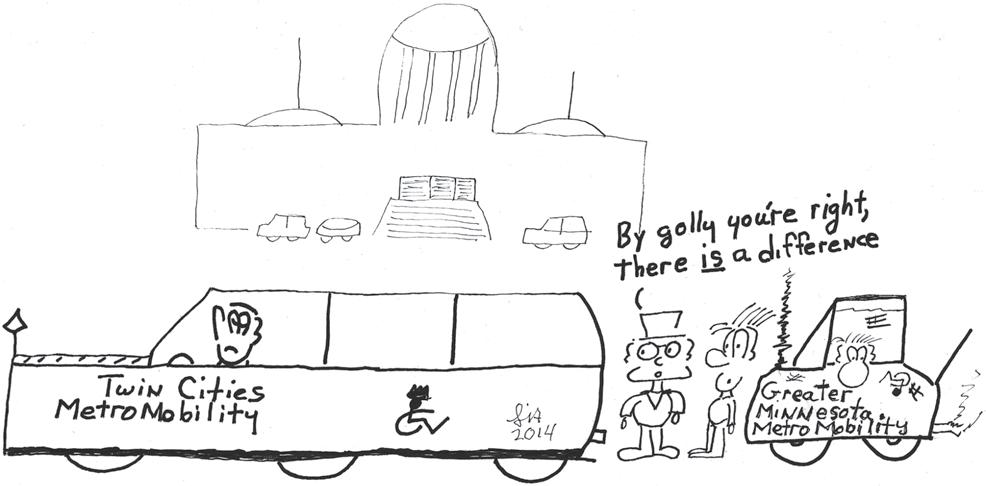
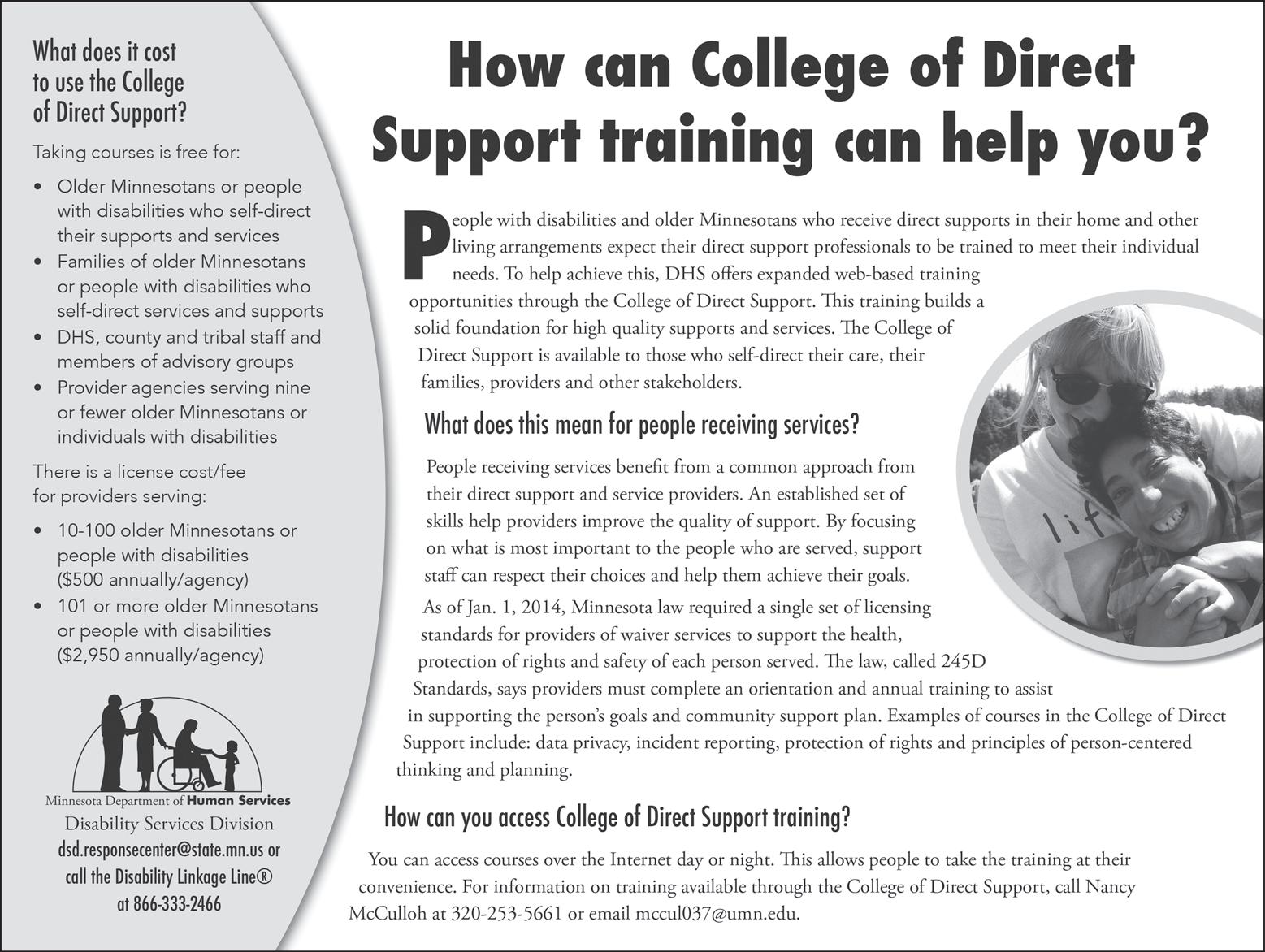

The March 17 closing of Riverwood Centers left nearly 4,000 residents of East Central Minnesota searching for new mental health service providers and scrambling to find therapists, therapy groups and continued medication. The Braham-based service provider was known for years as Five County Mental Health Centers. Only Isanti, Chisago and Pine counties were part of its contracted services for people who were uninsured or underinsured when it closed due to financial reasons. Riverwood Centers also had offices in Cambridge, Milaca, North Branch, Pine City and Mora. About 100 people were employed by Riverwood Centers.
Besides crisis services, Riverwood Centers provided psychological assessment and therapies, medication management, community-based mental health rehabilitation services for children and adults, anger management and offender treatment programs, individual, family and group therapy, and emergency inhome visits.
Isanti County Family Services Director Penny Messer told the Isanti County Times that the county had been paying $264,000 per year for its contracted services through Riverwood Centers. County officials knew the center had financial difficulties, but got less than one week’s notice of the closing. Other media reports indicate that the withdrawal of Mille Lacs County also had a negative impact on Riverwood Centers’ bottom line.
Crisis services and a 24-hour crisis hotline are being provided by another agency. Isanti County is working with other affected counties and other area mental health service providers, such as Allina Hospitals, Family Based Therapy Associates and Safe Transitions, to see if those agencies can meet clients’ needs. “Our Isanti County clients are the most important to us right now, and we are working with them to make sure they are receiving their case management services,” Messer said. “We are working hand-inhand with our resource lists, and all of our staff have this listing to pass on to Riverwood clients.”
“We have a heavy heart for those individuals right now,” Messer said. “We knew Riverwood Centers’ closing was a possibility due to its financial situation, and we knew when it happened we’d have to go into crisis mode. We are prepared and are finding these clients the resources they need.”
Other counties are also working with their clients. Chisago County is setting up an emergency hotline, offering resource referral and preparing staff to field a higher volume of calls from residents who have been impacted by the abrupt closing at Riverwood Centers. One concern for all of the counties affected by the closing is that data privacy regulations prohibiting Riverwood from sharing information with counties. ■
(Source: Isanti County News, Mille Lacs Messenger
Dollar zones give riders a break
Metro Mobility riders in the designated downtown Minneapolis and St. Paul zones will be getting a price break. The Metropolitan Council March 26 approved a $1 fare for Metro Mobility customers traveling within the designated zones. The fare change took effect April 1.
“It’s a matter of providing matching service between Metro Mobility and Metro Transit,” said Metro Mobility Manager Andrew Krueger. “Federal law requires that we charge no more than twice the fare for a comparable regular-route trip, which is 50¢ for a Metro Transit trip within the zone. The reduced fare for Metro Mobility establishes a corresponding fare.”
Metropolitan Council is the Twin Cities regional planning agency. The council contracts with five public and private providers for paratransit service, including Metro Mobility. Metro Mobility is a door-todoor transportation service for people with disabilities, with a regular fare of $3 and $4 for non-peak and peak travel times, respectively. In 2013, Metro Mobility provided more than 1.8 million rides to eligible and certified customers in the seven-county metro area.
Based on ridership information, staff estimate nearly 2,200 Metro Mobility trips occur each year wholly within the downtown zones, about 1,040 in Minneapolis and 1,150 in St. Paul. The fare change is seen as allowing paratransit riders to move affordably among and between restaurants, retail, businesses and activities within the designated areas.
Customers should schedule trips with their providers as usual, and to avoid paying the usual fare, simply remind the driver when they pay that they are riding only within the downtown zone. Anyone with questions is urged to call Customer Services at 651-602-1111 (TTY 651.221.9886) between 7:30 a.m. and 4 p.m., Monday through Friday. Questions and comments can also be emailed to metromobility@metc.state.mn.us ■
(Source: Metropolitan Council)
Several veterans' organizations are opposing a plan to tighten the rules for who can get into the state’s veterans homes. Under a new proposal, former prisoners of war, Purple Heart recipients and veterans with a service-connected disability rating of 70 percent or higher would move to the front of the line to get a space in a home. But spouses of veterans, who now have equal access to the state’s five veterans’ homes on a first-come first-served basis, would be knocked down in the pecking order.
Groups including the American Legion and the state’s county veterans’ service officers are objecting strenuously. They contend that the new rules violate an unspoken but solemn compact with spouses, who may be more in need than some veterans who would get priority over them.
“The veterans I talk to are just as concerned about a fellow veteran’s widow as they are about a fellow veteran. We’re all family,” Army veteran Tommy Johnson, a blogger, veterans advocate and a Veterans of Foreign Wars member from Hopkins told the Star Tribune. “Sure, other states may do that. Other states may do a lot less for the veterans than Minnesota does.”
While the veterans’ lobbying groups are a force at the state capitol, they are up against legislators who are equally committed to the chance. “My feeling is the veterans who have suffered the most as a result of their military service should have a priority in going into the homes,” said Rep. Jerry Newton, DFL-Coon Rapids, the author of the proposal, which is part of a bill before the Minnesota Legislature. The eligibility change was one of several recommendations made last year by a legislative committee, to address veterans’ homelessness and cut costs. Limiting spousal eligibility is one way to reduce costs.
Funding for long-term nursing like that provided in the state’s veteran homes is the most expensive form of care for a rapidly increasing elderly population. The $161.5 million it cost to operate Minnesota’s five stateoperated veterans homes made up 77 percent of the state Department of Veterans Affairs’ budget last year. ■
(Source: Star Tribune)
A Madelia woman has filed a lawsuit accusing Windom-based Staples Enterprises and Staples Oil Co. and owner Brent Staples of discriminating against her because of her disability. Plaintiff Brenda Mosser has epilepsy, but contends she was still capable of doing her job as customer service representative for a Madelia convenience store.
The Staples company bought the store in 2009. In August 2010 Mosser tripped on a carpet and suffered a workplace injury, resulting in a laceration on her right elbow. The complaint alleges Staples believed the fall was caused by Mosser’s disability, despite her assertion it was a normal accident.
According to the suit, Staples allegedly told Mosser’s manager “Why do we have a person with such a messed up life working here?”
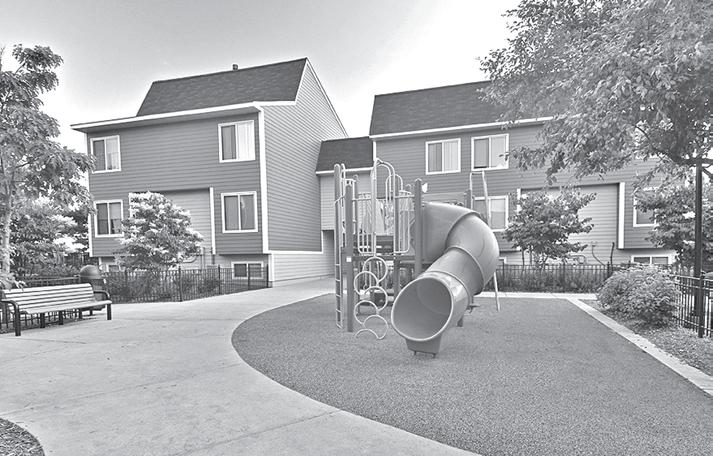
Mosser also alleges in the lawsuit that she was concerned about losing her job in retaliation for filing a complaint, and that after the store merged with another business in 2010, she was let go. Two more employees were hired after Mosser was terminated.
Mosser’s lawsuits charges Staples and his businesses with violating the Minnesota Human Rights Act and the Minnesota Workers’ Compensation Act. She is seeking damages in an amount greater than $50,000 and punitive damages as deemed appropriate by the court. Last year the Minnesota Department of Human Rights decided there is probably cause for a human rights violation.
Staples has denied the allegations in court filings, and in filings with the state. ■
(Source: Mankato Free Press)

Advocating Change Together (ACT)
Arc Greater Twin Cities
The Arc of Minnesota
V-651-641-0297TF-800-641-0059
V-952-920-0855F-952-920-1480
V-651-523-0823x115TF-800-582-5256
Association of Residential Resources in MNV-651-291-1086TTY-800-551-2211
V-651-646-8342F-651-603-2066
MCIL
MN Consortium for Citizens with DisabilitiesV-952-818-8718F-952-818-8719
MN Developmental Achievement-Center Assoc
PACER Center, Inc.
SEIU Healthcare Minnesota
Take Back the Air
Accessible Space, Inc. (ASI)
Dungarvin Minnesota, LLC
Mary T. Inc. Assisted Living
Dungarvin Minnesota, LLC
Mary T. Inc. Human Service Programs
Minnesota Brain Injury Alliance
Tandem Residential
V-651-647-9200F-651-647-9353
V-952-838-9000TTY-952-838-0190
TF-855-282-3769
V-952-303-6218F-952-303-6468
V-651-645-7271TTY-800-466-7722
V-651-699-6050TTY-651-695-5802
www.selfadvocacy.org
www.arcgreatertwincities.org
www.thearcofminnesota.org
www.arrm.org
www.mcil-mn.org
www.mnccd.org
www.mndaca.org
www.pacer.org
www.UnitedCareWorkersMN.org
www.takebacktheair.com
www.accessiblespace.org
www.dungarvin.com
V-763-754-2505TF-888-255-6400 www.marytinc.com
V-651-699-6050TTY-651-695-5802
V-763-754-2505TF-888-255-6400
V-612-378-2742TTY-800-669-6442
www.dungarvin.com
www.marytinc.com
www.braininjurymn.org
V-651-641-0491x315F-651-645-2780 www.tandemresidential.com
TBI Metro Services - Richfield & W. St. PaulV-612-869-3995V-651-457-4756 www.opportunitypartners.org
Vinland National Center
V/TTY-763-479-3555F-763-479-2605
DeafBlind Services Minnesota (DBSM) V-612-362-8454TTY-612-362-8422
Dungarvin Minnesota, LLC
Living Well Disability Services
Mary T. Inc. Human Service Programs
MCIL
Metro Work Center, Inc
Opportunity Partners
Reach for Resources
REM Minnesota
V-651-699-6050TTY-651-695-5802
V-651-688-8808F-651-688-8892
V-763-754-2505TF-888-255-6400
V-651-646-8342F-651-603-2066
V/TTY-612-729-7381F-612-729-7382
V-952-938-5511TTY-952-930-4293
V-952-988-4177F-952-988-6728
V-952-945-4952F-952-922-6885
S. MN Independent Living Enterprises & ServicesV/TTY-507-345-7139TF-888-676-6498
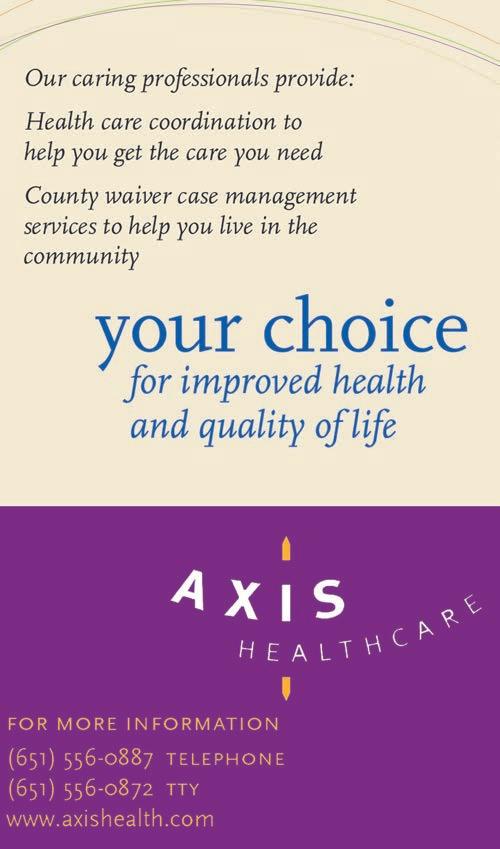
www.vinlandcenter.org
www.dbsmllc.org
www.dungarvin.com
www.livingwell.org
www.marytinc.com
www.mcil-mn.org
www.metroworkcenter.org
www.opportunitypartners.org
www.reachforresources.org
www.remminnesota.org
www.smilescil.org






Ally People Solutions
Chrestomathy, Inc.
V-651-641-0709F-651-641-0976
www.allypeoplesolutions.org
V-952-974-0339F-952-974-0307 www.chrestomathyinc.org
Community Involvement Programs (CIP)V-612-353-4595x101V-612-353-4595x102 www.cipmn.org
Courage Kenny Rehabilition Institute
Dungarvin Minnesota, LLC
East Suburban Resources, Inc.
V-612-775-2569
V-651-699-6050TTY-651-695-5802
V-651-351-0190
Equip A Life (formerly Assistive Techology of MN)V-763-479-8239
Goodwill/Easter Seals Minnesota
Kaposia Inc.
Lifetrack - Minneapolis
Lifetrack - St. Paul
Lifeworks Services, Inc.
Merrick, Inc.
Metro Work Center, Inc.
Midwest Special Services, Inc.
Minnesota Diversified Industries (MDI)
Opportunity Partners
Partnership Resources, Inc.
Partnership Resources, Inc. - Minneapolis
TF-866-535-8239
www.allinahealth.org/couragekenny
www.dungarvin.com
www.esrworks.org
www.equipalife.org
V-651-379-5800F-651-379-5803 www.goodwilleasterseals.org
V/TTY-651-224-6974F-651-224-7249 www.kaposia.com
V-612-788-8855F-612-788-8577 www.lifetrack-mn.org
V-651-227-8471TTY-651-227-3779 www.lifetrack-mn.org
TF-866-454-2732TTY-651-365-3736 www.lifeworks.org
V-651-789-6231F-651-789-9960
www.merrickinc.org
V/TTY-612-729-7381F-612-729-7382 www.metroworkcenter.org
V-651-778-1000F-651-772-4352 www.mwsservices.org
V-651-999-8200F-651-999-8242
www.mdi.org
V-952-938-5511TTY-952-930-4293 www.opportunitypartners.org
V-952-925-1404F-952-925-6055 www.partnershipresources.org
V-612-331-2075F-612-331-2887 www.partnershipresources.org
Partnership Resources, Inc. - Older Adults ProgramV-952-746-6206F-952-746-6209 www.partnershipresources.org
ProAct Inc.
V-651-686-0405F-651-686-0312 www.proactinc.org
V-763-571-6789F-800-632-0798 www.accessoptionsmn.com
Accessibility Design V-952-925-0301F-952-926-7712 www.accessibilitydesign.com
Accessible Homes, LLC. V-612-978-1054F-651-554-3085 www.accessiblehomesllc.net
Equal Access Homes, Inc.
V-651-249-7751F-651-450-1330 www.EqualAccessHomes.com
Equip A Life (formerly Assistive Techology of MN)V-763-479-8239 Hibbing-218-741-9134 www.equipalife.org
Accessible Space, Inc. (ASI)
Dungarvin Minnesota, LLC
V-651-645-7271TTY-800-466-7722 www.accessiblespace.org
V-651-699-6050TTY-651-695-5802 www.dungarvin.com
Ebenezer Park Apartments V-612-879-2233TTY-612-879-8889 www.fairviewebenezer.org
HousingLink V-612-522-2500F-612-521-1577 www.housinglink.org
National Handicap Housing Institute, Inc V-651-639-9799F-651-639-9699 www.nhhiaccessiblehousing.com Villas and Townhomes by Mary T. Inc. V-763-754-2505TF-888-255-6400 www.marytinc.com
MN
Handi
HME
Key
Liberty Oxygen & Medical Equipment
Phoenix Medical Services Inc.
Tamarack Habilitation Technologies, Inc.
V-651-294-0710TF-800-886-7201
V-612-334-5970TF-800-292-4150
V-651-644-9770F-651-644-0602
V-800-258-6313F-800-258-6313
V-651-792-3860F—651-792-3867 www.keymedicalsupply.com
V-952-920-0460F-952-920-0480 www.libertyoxygen.com
V-651-636-0848F-651-636-5746 www.PhoenixMedical.org
V-763-795-0057TF-866-795-0057 www.tamarackhti.com
Community Involvement Programs (CIP)V-612-362-4434V-612-362-4452
Dungarvin Minnesota, LLC
V-651-699-6050TTY-651-695-5802
Fraser V-612-861-1688F-612-861-6050
Lifetrack Resources - St. Paul
V-651-227-8471TTY-651-227-3779
National Alliance on Mental Illness of MNV-651-645-2948TF-888-NAMI-Helps
Vinland National Center
Wound Healing Center
www.cipmn.org
www.dungarvin.com
www.fraser.org
www.lifetrackresources.org
www.namihelps.org
V/TTY-763-479-3555F-763-479-2605 www.vinlandcenter.org
V-715-268-0175TTY-715-268-0177
RECREATION-ADAPTIVE HOBBY/EXERCISE/SPORTS/ARTS
Capable Partners Inc.
Courage Kenny Rehabilition Institute
Drama Interaction, 501(c)3
Mind Body Solutions
Mixed Blood Theatre Company
Simply ArtAble (formerly Simply Jane)
Upstream Arts
RECREATION-TRAVEL/CAMPING
Camp Character
Camp Winnebago
Hammer Travel
True Friends
Ventures Travel
Wilderness Inquiry
V-763-439-1038
www.AmeryMedicalCenter.org
www.capablepartners.org
V-612-775-2277218-726-4762 www.allinahealth.org/couragekenny
V-952-220-1676 www.cokartscenter.com/opportunitypartnersprog.html
V-952-473-3700 www.mindbodysolutions.org
V-612-338-6131
www.mixedblood.com
V-612-354-3961 www.simplyjanestudio.com
V-612-331-4584F-612-353-6638
V-218-760-8442
V-507-724-2351F-507-724-3786
www.upstreamarts.org
info@familyfoundationsmn.com
www.campwinnebago.org
V-952-277-2458TF-877-345-8599 www.HammerTravel.org
V-952-852-0101TF-800-450-8376
V-952-852-0107TF-866-692-7400
V-612-676-9400
TF-800-728-0719
www.truefriends.org
www.venturestravel.org
www.wildernessinquiry.org
REHABILITATION (PHYSICAL, OCCUPATIONAL, SPEECH, AUDIOLOGY THERAPISTS)
Courage Kenny Rehabilition Institute
V-763-588-0811V-612-262-7979
DeafBlind Services Minnesota (DBSM) V-612-362-8454TTY-612-362-8422
Fraser V-612-861-1688F-612-861-6050
Gillette Children’s Specialty Healthcare
In Home Personal Care
Lifetrack Resources - St. Paul
V-651-291-2848TF-800-719-4040
V-763-546-1000F-763-546-1018
V-651-227-8471TTY-651-227-3779
RESIDENTIAL/GROUP HOME PROGRAMS
Capstone Services, LLC
V-651-641-0042 x211F-651-645-2780
Community Involvement Programs (CIP)V-612-362-4403V-612-362-4417
Dungarvin Minnesota, LLC
Fraser
V-651-699-6050TTY-651-695-5802
V-612-861-1688F-612-861-6050
www.allinahealth.org/couragekenny
www.dbsm.org
www.fraser.org
www.gillettechildrens.org
www.inhomepersonalcare.com
www.lifetrackresources.org
www.capstoneservices.net
www.cipmn.org
www.dungarvin.com
www.fraser.org

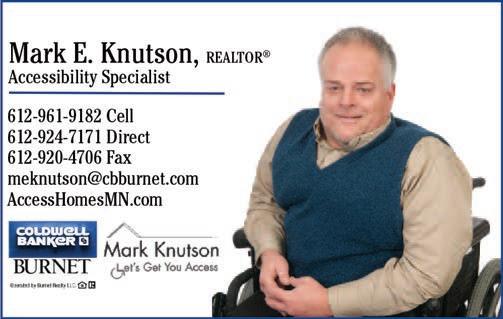







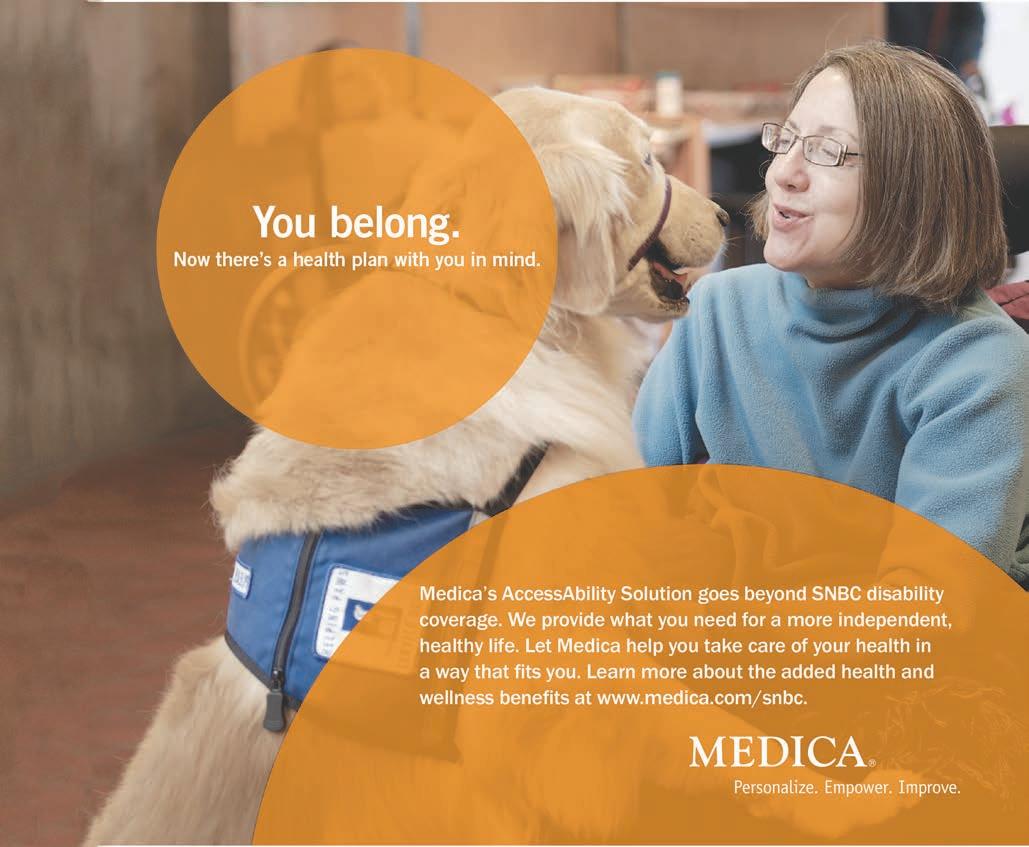


In her 40 years with Rise, Director of Human Resources Mary Stransky was part of tremendous change and growth, not only within Rise, but in the disability employment services field.
Stransky retired from Rise in March.
“Mary has been a wonderful colleague and friend for many years,” said President Lynn Noren. “She has led our efforts to support the Rise staff team, continually improving our human resources practices as we have grown. Looking back, it is amazing what Mary has accomplished.”
While working in an internship toward her B.S. degree in social work from what is now Minnesota State University, Mankato, Stranksy assisted a young woman who was moving from St. Peter State Hospital to the Anoka County area for residential and day programming services. Stransky brought the young woman to Rise for a tour. Upon college graduation, Stransky was offered a job in the position known then as work activity supervisor.
“It was a different world back then,” Stransky said. “There were ten people on Rise’s staff working with about 30 people who had developmental and physical disabilities. We offered two programs, vocational evaluation and sheltered employment. Our work and office space was a converted utility truck garage. Everything was pretty low-tech.”
Stransky worked with clients on Rise’s production floor, did skills training and led discussions on current social topics. “We knew we were doing important work and were especially excited when we were able to help get someone a job in the community,” she said.
Rise faced organizational and financial challenges in its early years, Stransky said. “Rise went through some key leadership changes in the summer of 1976. It was like working at a new place. We started doing things programmatically that none of us knew were possible. Things started changing quickly and along with my co-workers, I felt energized with a renewed commitment and passion. It was really exciting for all of us.”
Over time Rise added staff and programs. When a human resources department was added, Stransky became the director.
“I think the primary reason for Rise’s success is the synergy our staff has had,” she said. “We’ve been fortunate to have really talented, committed staff who complement and balance each other. We have visionaries who create great programs as well as people who can provide the nuts and bolts to build and maintain effective services.” ■
The Transitional Rehabilitation Program at Courage Kenny Rehabilitation Institute - Golden Valley campus (also known as Abbott Northwestern Courage Residence) was named one of the top performing skilled nursing facilities recently by U.S. News and World Report
“Courage Kenny Rehabilitation Institute’s Transitional Rehabilitation Program is honored to be recognized as one of America’s Best Nursing Homes. This honor validates the exceptional care and service that the staff, employees and volunteers provide, and confirms our commitment to the delivery of comprehensive, integrated and person-centered rehabilitation,” said Transitional Rehabilitation Program Direct Matt Kinne.
The complete report is at http://tinyurl.com/mw5yxck ■
West Metro Miracle League is preparing for expanded offerings during the 2014 season. The West Metro Miracle League is a charitable organization providing children in the west metro area. Participants range from age three to 19, and are athletes with cognitive or physical challenges. The young athletes enjoy the opportunity to play baseball. The league is located and fully integrated in the Bennett Family Ballpark in Minnetonka, home of seven baseball diamonds accommodating tee ball though Little League and Babe Ruth League.
“In a league where everyone hits, everyone gets on base and everyone crosses home plate, there is a great deal of fun to be had by all the players and volunteers involved,” said Tim Hawley, West Metro League Athletics president. Hawley is a resident of Deephaven and vice president of marketing and communications at International Dairy Queen Corporation, a longtime team sponsor. “As a parent of a special needs child, there is no greater satisfaction than witnessing the joy these children experience as they play baseball side-by-side with their buddies.”
Registration closed March 30 for the 2014 baseball season. The league started its season at Minnetonka High School’s Tonka Dome with a pre-season clinic. Parents can check to see if there are still any openings. Everyone is welcome at games and there are many volunteer opportunities.
With games every Saturday, Sunday and Tuesday during May and June at Bennett Family Park, players are paired with a volunteer buddy for a fun-filled season of baseball on the official Subway Restaurants –
The high-flying Robins of Robbinsdale/Hopkins/ Mound Westonka made history at the Minnesota State High School league adapted floor hockey tournament in March, winning a record fourth straight state title in the PI or physically impaired division. The state tournament was held at Bloomington Jefferson High School. The Robins defeated the Minneapolis South Tigers, 10-0, in the opening round. Then they defeated the Rochester Raiders, 13-2.
For the third straight years the Robins faced the Hawks of Dakota United for the state title. Five Robins scored goals in the 8-3 win.
The Robins became the first team in PI adapted floor hockey history to earn a four-peat. The Robins finished the season with a perfect 16-0 record. It was the Robins’ 10 PI title overall. Dakota United is a cooperative that includes Apple Valley, Eagan, Eastview and Rosemount high schools. The Hawks were 14-2 this season, with both losses to the Robins.
Brainerd-Pillager won the third place crown, defeating Rochester. In the consolation round, AnokaHennepin defeated South Suburban, 9-6. The other team in the PI tournament was Wayzata-Hopkins.
A new champion was crowned in the CI or cognitively impaired division. A cooperative of New Prague/Tri-City United/LeSeuer-Henderson/Belle Plaine/Jordan claimed the state CI title with a 9-7 win over the Burnsville/Farmington/Lakeville Blazing Cats in the finals. It was the first-ever state title for the Trojans, who finished 12-0 for the season.
The Trojans defeated South Suburban, 13-4, and Anoka-Hennepin, 15-1, en route to the title game. The Blazing Cats finished 10-2.
North Suburban, the defending state champion, won third place, 12-4, over Anoka-Hennepin. Dakota United won the CI consolation trophy, 6-3, over Owatonna. The other school in the tournament was Maple Grove. ■
Harmon Killebrew Field. The field features a special rubberized surface enabling athletes of all ages to safely navigate the bases.
In an effort to expand the league’s offerings to an even more diverse range of children and youth with special needs, West Metro Miracle League will introduce a new “Player’s League” this season. This is a league for athletes requiring only minimal help from buddies.

Families travel from as far as 25 miles away to participate in Miracle League games, and come from places including Hutchinson, Shakopee, Edina and Maple Plain.
From humble beginnings on a dirt field with just four teams of 33 players, and 250 buddies and volunteers in 2008, West Metro Miracle League in 2013 fielded 150 players on 12 teams, with more than 1,000 buddies and volunteers.
Hawley, who has one child who plays in the league and another two children who volunteer as buddies, looks forward to the league’s baseball season each year. “It’s such a positive environment for everyone involved. Every child, no matter the physical or cognitive challenge, can come out and have a great time. It’s all about the smiles on everyone’s faces,” he said. Hawley has plans to expand the league in the future, with the hope of one day building a home where kids with special needs can live when they become independent adults.
The cost to register a player is $75 per child; families with more than one child receive a discount of $5 per child when registered at the same time. To see if there are openings go to www.westmetromiracle league.org and click the registration tab, For more information call Tonya Andruskiewicz, league communications director, at 612-396-1256. ■
After more than four years, Nell Hurley is leaving as executive director of the Minnesota Recovery Connection. She has accepted a position at the Hazelden Betty Ford Foundation and starts there in April.
The organization’s board of directors has started a search for a replacement. Board Chairman Judson Kim Bemis will step down from the board leadership post and will serve as interim executive director. Bemis has almost 30 years’ experience with nonprofits.
“I am very proud of the work I (and we) have done at MRC since the organization started in 2010 and for the opportunity to lay the foundation from which
People and Places - p. 14
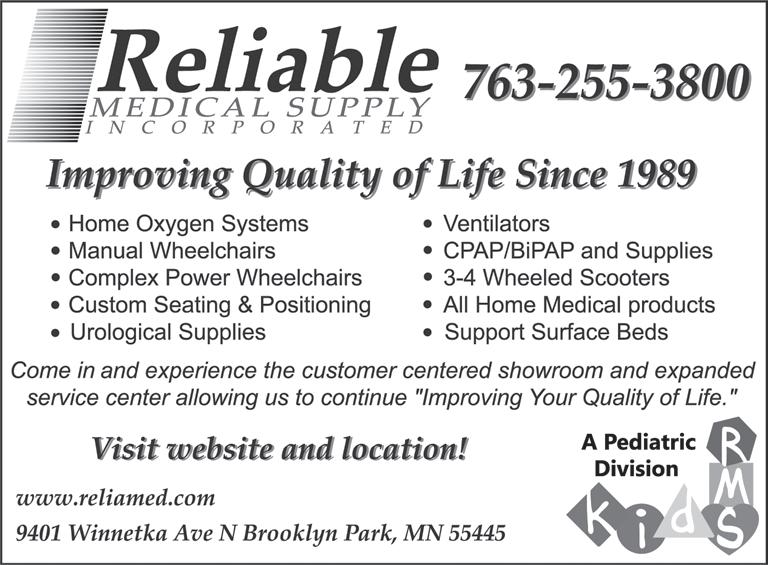

Welcome to the Access Press Accessible Fun listings, a sampling of theater, music, arts, walks, runs, dances and gala events for our community. Readers looking for additional opportunities to enjoy the arts have these options:
VSA Minnesota unveiled its new website on Feb 17. The site at http://vsamn.org/ has a large calendar at in the upper right hand corner of the home page. VSA Minnesota would like feedback on the design, so users should weigh in on the site or at access@vsamn.org or 612-332-3888 ext. 2. The new website is intended to be easier for volunteers to maintain and expand. Users of the site should change their bookmarks if they haven’t already done so.
For information on galleries and theater performances around the state join the Access to Performing Arts email list at access@vsa.n.org or call VSA Minnesota, 612-332-3888 or statewide 800-801-3883 (voice/TTY). To hear a weekly listing of accessible performances, call 612-332-3888 or 800-801-3883.
Another web events listing is http://c2net.org (c2: caption coalition, inc.), which does most of the captioned shows in Minnesota and across the country. Facebook is another way to connect with performances. Sign up to connect with Audio Description Across Minnesota (http:// tinyurl.com/d34dzo2). Connect with ASL Interpreted and Captioned Performances across Minnesota on Facebook http://tinyurl.com/FBcaption
Upstream Arts is throwing its first–ever annual meeting and fundraiser, 5-8 p.m. Sat, May 17 at Pillsbury House Community Center, 3501 Chicago Ave. S., Mpls. Come meet new friends in the arts, education, and disability communities; learn about plans for 2014-15; enjoy a performance and exhibit by teaching artists and participants. More details will be posted soon. FFI: www.upstreamarts.org
Lupus Food and Wine Classic
Tickets for the annual Lupus Food and Wine Classic are going fast. The event is 5:30-8:30 p.m. Wed, May 7 in the Great Room, Mall of America, Bloomington. Enjoy food, wine tasting, live entertainment, a silent auction, goody bags and more. Help the Lupus Foundation of Minnesota kick off Lupus Awareness Month, all supporting the mission of the Lupus Foundation of Minnesota. Tickets start at $75 and must be purchased in advance. FFI: 952-746-5151, 800-645-1131, www.lupusmn.org
Walk for Autism
The Fraser Walk For Autism, presented by BMO Harris Bank, starts at 7 a.m. Sat, April 12 at the Mall of America Rotunda. The family-friendly event is filled with sensory-friendly activities, games, therapy animals, great prizes and giveaways. All participants receive breakfast and an official Fraser Walk for Autism t-shirt. Register as an individual walker or a member of a walk team. Register online before the event or register that day. FFI: Rose Rosario, 612-798-8343, events@fraser.org

Rise Above Seizures
The Epilepsy Foundation of Minnesota’s 12th annual gala, Rising Above Seizures, is 6:30-10 p.m. Sat, April 12 at the Radisson Blu Mall of America, 2100 Killebrew Drive, Bloomington. This year’s event features America’s Got Talent Finalist / Indoor Kite Flyer Connor Doran. Tickets start at $100. Cocktail attire is suggested. Enjoy dinner, silent and live auctions and entertainment. Proceeds benefit Minnesotans with epilepsy. FFI: 800-779-0777, ext. 2310.
Diana Ross is headliner
PACER Center’s annual benefit will feature Diana Ross, one of the most remarkable entertainers of all time. The benefit is Sat, May 3 at the Mpls Convention Center. As lead singer of The Supremes, Ross helped shape the sound of popular music, achieving the unprecedented feat of 12 number one singles. Ross earned six number one singles and 31 top ten hits as a solo artist. She is also an Oscar-nominated actress and winner of both Golden Globe and Tony Awards. The benefit supports free PACER Center programs for children with disabilities and their families as well as PACER’s National Bullying Prevention Center. Tickets start at $70 and include Ross’ performance plus silent and live auctions. A post-concert patron party is included with tickets valued at $150 or more. FFI: 952-838-9000, www.PACER.org
Red and White Ball
Opportunity Partners will host its benefit The Red and White Ball at 5:30 p.m. Sat, April 12 at the Marriott Mpls Northwest. 7025 Northland Drive N., Brooklyn Park. This year’s event, which features KARE-11’s Karla Hult as emcee includes social hour, dinner, games, dancing and auctions, has a baseball theme. Red, white or black cocktail attire should be worn. Tickets are $85 and all proceeds support Opportunity Partners” program. To sponsor the event or donate an auction item, contact Dawn Piburn at 952-912-7448 or dpiburn@opportunities.org To volunteer, contact Liz Burgard at 952-912-7454 or eburgard@opportun ities.org. FFI: 952-930-4286, events@opportunities.org
The Mountaintop Penumbra Theatre and Arizona Theatre present a drama that reimagines the night before the assassination of Dr. Martin Luther King, Jr. after he has just delivered one of his most memorable speeches, at the Guthrie Theater, McGuire Proscenium Stage, 818 2nd St. S., Mpls. AD and ASL shows are 1 p.m. Sat, April 12. Captioning is 7:30 p.m. Fri, April 18. Tickets are reduced to $20 for AD/ASL, $25 for Captioning (regular $34-64). FFI: 612-377-2224, TTY 612-377-6626, www.guthrietheater.org/visit/access_services
The Cherry Orchard Northfield Arts Guild presents Chekov’s classic tale, at 411 W. 3rd St., Northfield. ASL show is 7:30 p.m. Sat, April 12 (with advance reservation of one week or more). Tickets are $15, $10 student/senior. FFI: 507-645-8877, www.northfieldartsguild.org

Dames at Sea
The campy, comical musical is presented by North Hennepin Community College Theatre, at the North Hennepin Community College Fine Arts Center Theatre, 7411 85th Ave. N., Brooklyn Park. ASL show is 2 p.m. Sun, April 13. Tickets are $10, senior, children, matinees $7. FFI: 763-493-0543, www.nhcc.edu/theatre.
Balloonacy
The story of a solitary old man and the balloon he befriends is presented by Children’s Theatre Company at the company’s Cargill Stage, 2400 Third Ave. S., Mpls. AD show is 2 p.m. Sat, April 19. Ask about special price rates for AD patrons (regular $16-21). FFI: 612-874-0400; tickets@childrenstheatre.org, www.childrenstheatre.org
Detroit
Jungle Theater presents the story of a couple whose lives are changed by new neighbors, at Jungle Theater, 2951 Lyndale Ave. S., Mpls. AD show is 7:30 p.m. Thu, April 24. Assistive listening devices available. Ticket are reduced to $14 (regular $25-43); AD season ticket $70. FFI: 612-822-7063; boxoffice@jungletheater.com, www.jungletheater.com
The True Story of the 3 Little Pigs
Stages Theatre Company presents the story of what happens when the Big Bad Wolf goes on trial, at Hopkins Center for the Arts, 1111 Mainstreet, Hopkins. ASL show is 2 p.m. Sun, April 27. Tickets are $15, child/student $12; with a discount for AD/ASL/OC: $11, child/senior 60+: $9. FFI: 952-979-1111, x4, www.stagestheatre.org
Art in Bloom
Mpls Institute of Arts, 2400 Third Ave. S. hosts free disability-friendly tours. ASL tour is 7 p.m. Thu, May 1, and 12:15 p.m. Sun, May 4. (Tour begin in second floor rotunda). On the second Fri & Sat of each month at 10:30a.m., free tours are offered for visitors with memory loss, Alzheimer’s and their friends or care partners (April 11-12, May 9-10, and June 13-14). Assisted listening devices, wheelchairs and verbal description tours are available. FFI: 612-870-3131, 612-870-3140, TTY 612870-3132; dhegstro@artsmia.org, http://www.artsmia.org
Passing Strange
Mixed Blood Theatre presents the Tony Award-winning musical at Alan Page Auditorium at Mixed Blood Theatre, 1501 S. 4th St., Mpls. Every performance will be captioned. AD show is 7:30 p.m. Thu, May 1, and Sat, May 10. Pre-show tactile tours available on request. ASL show is 7:30 p.m. Sat, May 10. For ASL and AD shows, RSVP to Brie Jonna brie@mixedblood.com, 612-338-5403. For tickets choose between first-come, first-served, nocost admission under Mixed Blood’s Radical Hospitality program, or guarantee admission ($20). For access discounts and free transportation, any patron who self-identifies as having a disability is eligible for a no-cost advance guaranteed reservation and for a free cab ride to and from the theatre. Call the Box Office for more information and to reserve these services. FFI: 612-338-6131, boxoffice@mixedblood.com, www.mixedblood.com ■


Learn about MnCHOICES
MnCHOICES is a new way to assess needs of people who need long-term services and supports. People with disabilities and family members can attend What is MnCHOICES?, a Sages forum 1-3 p.m. Fri, May 2 at Christ the King Church, 8600 Fremont Ave. S., Bloomington. Nancy Jurgensen of Minnesota Department of Human Services and Rosemary Geist of Dakota County will give an overview of MnCHOICES, which will be used annually to assess all Minnesota residents with disabilities who use government services. MnCHOICES was launched in Ramsey and Dakota counties in 2013 and will be introduced statewide this year. Register by Tue, April 29. Cost is $15 at the door. Checks are payable to ISD #271. Sages is a collaboration of community organizations offering education about disability issues for self-advocates, family members, caregivers and service providers for people with disabilities. The organizations of Sages are The Arc Greater Twin Cities, Fraser, The Learning Exchange, Living Well Disability Services, Opportunity Partners and ProAct. FFI: Gina Carpenter, 952-681-6122, gcarpenter@bloomington.k12.mn.us
Minnesota Autism Conference
The 19th Annual Minnesota Autism Conference, presented by the Autism Society of Minnesota (AuSM), is April 30 – May 3 at the DoubleTree Hilton by Mpls Park Place Hotel, 1500 Park Place Blvd., Mpls. It is open to the public and is beneficial for educators, doctors, clinicians, therapists, employers, caregivers, paraprofessionals and parents and families of individuals on the autism spectrum, including adults with autism spectrum disorder (ASD). Speakers include author and radio host Garrison Keillor and several well-known professionals in the autism field. Registration fees are $105 per day for AuSM members and $135 per day for non-members. Evening presentations on Wednesday and Thursday are an additional fee of $40 for AuSM members and $50 for nonmembers. The complete schedule is online. FFI: 651647-1083, news@ausm.org, www.ausm.org
TAAC appointees sought
Metropolitan Council Seeks applicants for four vacancies on the Transportation Accessibility Advisory Committee (TAAC), which advises the council on management policies for special transportation services in the region, including Metro Mobility. The TAAC must include riders and advocates for older people and the disability community, as well as representatives of service providers and other appropriate agencies. Applicants are sought from four districts. District B includes western Hennepin County, Carver County and Scott County, except for New Prague. District E include parts of Anoka and Ramsey counties. District F includes Washington County and part of Ramsey County. District H includes most of Dakota County. At least half of the committee must be certified as ADA paratransit eligible under the Americans with Disabilities Act and be active users of public ground transportation in the metro area. Terms are up to four years, concurrent with the Council’s, and would expire in January 2015. The deadline for applications is April 30. FFI: David Russell, 651-602-1662, david.russell@metc.state.mn.us
Housing resource fair
PACER Center hosts its 10 th Annual Housing Resource and Information Fair, a free event for families of teens and young adults with disabilities, 9 a.m. to noon Sat, April 12 at PACER Center, 8161 Normandale Blvd., in Blooming-ton. Advance registration is required for this popular event. It is important for parents of children and young adults with disabilities to explore options for housing and independent living as early as possible. Families will have the opportunity to meet with service providers and discuss housing options, services, supports, and related issues for children and young adults with disabilities. State and county representatives and staff of resource and referral organizations will be available to answer questions. FFI: 952-838-9000, 800-537-2237 (toll free), www.PACER.org
Hmong family group meets
Hmong families enrolled in St. Paul Public Schools, with a child with an intellectual or developmental disability, can join the Hmong Family Group. The free networking group from The Arc Greater Twin Cities meets 5:307:30 p.m. Fridays April 11 and May 2 at the St. Paul Public Schools Administration Building, 360 Colborne St., St. Paul. The entire family is welcome to the group’s
meetings. While parents attend the informational segment of the meeting, children enjoy games and activities. Meals, transportation, interpretation and childcare are provided at no cost to families. The group is free but preregistration is required. FFI: 952-915-3624
PACER offers workshops
PACER Center offers many useful free or low-cost workshops and other resources for families of children with any kind of disabilities. Workshops are at PACER Center, 8161 Normandale Blvd., Bloomington, unless specified. Advance registration is required for all workshops. Check out PACER’s website and link to a new bimonthly newsletter of workshops statewide that allows participants to pick and choose sessions catered to their needs. One upcoming free workshop is Taking the Next Steps: Planning for Success in Postsecondary Education, 6:30-8:30 p.m. Thu, April 17. Postsecondary education is becoming increasingly important as emerging career fields require workers to have skills that can only be obtained by education beyond high school. FFI: 952838-9000, 800-537-2237 (toll free), www.PACER.org
Find activities at hub
The Youth Legacy Foundation has expanded its offerings for youth with disabilities adding an events listing for the many programs and resources available for youth with disabilities. This includes disability-specific and mainstream options where accommodations can be made to promote community inclusion. One recent feature was the Wisconsin Youth Leadership Forum summer retreat. Check the forum webpage regularly for events and opportunities. FFI: www.youthleadershipfoundation.org
Vision check for service dogs
Ophthalmologists from BluePearl Veterinary Partners will be conducting free eye exams for service dogs during the annual ACVO/Merial National Service Dog Eye Exam Event in May. The eye exams will be provided free of charge to eligible service animals including detection dogs, guide dogs, handicapped assistance dogs, police dogs, search and rescue dogs and therapy animals. Registration for the free eye exams must be completed by service animal owners or handlers at ACVOeye exam.org by April 30. To qualify, animals must be “active working animals” that were certified by a formal training program or organization or are currently enrolled in a formal training program. The certifying organization can be national, regional or local in nature. Owners/agents for the animal(s) must FIRST register the animal via an online registration form beginning April 1. Once registered online, the owner/agent will receive a registration number and will be allowed access to a list of participating ophthalmologists in their area. A few Twin Cities area clinics are participating. FFI: ACVOeyeexam.org
Free help with house painting
The Metro Paint-A-Thon helps low-income seniors and people with disabilities continue to live independently in their own homes, enriching their lives and their neighborhoods. The deadline to apply is April 14. Each August,
thousands of volunteers scrape, prime and paint these homes at no cost to the homeowner. The effort brings stability and renewal to neighborhoods in cities throughout the seven-county metro area. This year, volunteers from companies, congregations, civic groups, and schools will paint homes during the summer, culminating the weekend of August 2-3. To qualify, homeowners must own and occupy a single-family home, in need of paint, but not in need of major repairs. The home must be in Anoka, Carver, Dakota, Hennepin, Ramsey, Scott or Washington counties. The homeowner must be 60 years of age or older, or have a permanent physical disability (if under age 60) and meet monthly income guidelines. FFI: 612- 276-1579, paintathon.gmcc.org
Vet Connection Group meets in Minneapolis
NAMI Vet Connection gives veterans the opportunity to talk with other veterans and share their experiences, and the successes and hardships of the reintegration process. The group meets 2:15-3:45 p.m. Mondays at the Mpls VA, 1 Veterans Drive, in Room 1B-102 (1st floor). FFI: Rebecca, 612-801-7415 or Brian, 651-645-2948 x116
Adult support groups offered
Autism Society of Minnesota (AuSM) offers free support groups for adults with Autism Spectrum Disorder. Groups include those for adult family members, women with ASD and independent adults with ASM. Groups meet monthly throughout 2014. Groups meet monthly at the AuSM offices at 2380 Wycliff St, St Paul. FFI: 651647-1083 ext. 10, www.ausm.org
UCare meetings
UCare hosts informational meetings about its UCare for Seniors Medicare Advantage plan, as well as informational meetings about the UCare’s new UCare Choices and Fairview UCare Choices health plans available on MNsure, Minnesota’s health insurance marketplace. Learn about the various plans, as well as key dates and penalties associated with health care reform. Meetings are held all over the region. UCare for Seniors has more than 75,000 members across Minnesota and western Wisconsin. UCare serves Medicare-eligible individuals and families enrolled in income-based Minnesota Health Care Programs, such as Minnesota Care and Prepaid Medical Assistance Program; adults with disabilities and Medicare beneficiaries with chronic health conditions and Minnesotans dually eligible for Medical Assistance and Medicare FFI: 1-877-523-1518, www.ucare.org
Share a smile
Brighten the day of a senior citizen in north or southwest Minneapolis and have fun. Visit an elder and do things together: movies, games, crafts or just friendly conversation. Hang out with an elder on a regular basis and do things that you both enjoy, like watching a movie, building stuff, playing games or friendly conversation. One-time or ongoing opportunities through the NIP Senior Program. FFI: Jeanne, 612-746-8549, srvolunteer@neighborhoodinvolve.org, or www.neighborhoodinvolve.org ■


New equipment is available
Listening to audio books just got easier. National Library Service now has USB cables to connect its cartridges directly to computers, making it easier to transfer audio books to cartridges for playback on the library’s digital players. When connected to the personal computer, the cartridge will appear on computers as a removable storage device. (Microsoft Windows PC users will find this under the “My Computer” icon.)
Also available for use with the digital players are new stereo headphones that are smaller and lighter weight than the old ones. Users can also obtain new USB flash (or thumb) drive elbows that fit into the side USB ports on digital players and allow flash or thumb drives to lay alongside the player instead of sticking out. Pillow speakers and Breath Switch adaptors for the digital players are also available. To order or ask questions about the new equipment, call the Minnesota Radio Talking Book equipment desk at 651-642-0885 or 1-800-652-9000. Books broadcast on the Minnesota Radio Talking Book Network are available through the Minnesota Braille and Talking Book Library in Faribault Call 1-800722-0550, 9 a.m. - 4 p.m., Monday through Friday. The catalog is online at www.mnbtbl.org, click on the link Search the Library Catalog. Persons living outside of Minnesota may obtain copies of books via inter-library loan by contacting their home state’s Network Library for the National Library Service.
Listen to the Minnesota Radio Talking Book, either live or archived programs from the previous week, on the Internet at www.mnssb.org/rtb. Call the Talking Book Library for a password to the site. To find more information about Minnesota Radio Talking Book Network events go to the Facebook site at http://tinyurl.com/ RadioTalkBook. Audio information about the daily book listings is also on NFB Newslines. Register for NFB Newslines by calling 651-539-1424.

MRC will continue to grow and expand,” said Hurley. “It has been an honor to work with so many passionate recovery advocates and I have tremendous gratitude for each and every one of you—whether you are a volunteer, family member, donor, a professional in the field, or another ally—thank you for supporting MRC’s mission of strengthening the recovery community through peer-based recovery support, public education, and advocacy.”
Minnesota Recovery Connection’s mission is to strengthen the recovery community through peer-topeer support, public education, and advocacy. The organization works with people who are recovering from addiction to alcohol and other drugs. ■

FRIEND SPONSOR
($50 and above)
Monte Blair (in memoriam)
Ellen Boucher
Susan Bulger
Yoshiko Dart
Teresa Dock
Mel & Georgia
Duncan
Steve & JoAnn Erbes
Lee Ann Erickson
Claudia Fuglie
Marjorie Goldberg
Pamela Hochrein
Laurie Jarvis
Sandi Lane
Gene Martinez
Christopher Meyer
Twyla Misselhorn
Lee Ohnesorge
William & Joen Overby
Linda Paulson
Kelly Rathcke
Virginia Schwartzbauer
John Sherman
Amanda & Mark Tempel
Equity Services of St. Paul
Hammer Residences
MBW Company

Access Press is one of the publications featured at 9 p.m. Sundays on the program It Makes a Difference.
Your Personal World (Saturday at 1 p.m.) is airing Ten Years Later, by Hoda Kotb; For the Younger Set (Sunday at 11 a.m.) is airing The Elites: Privileged Positions, by Emily Flint and Quinn Xi; Poetic Reflections (Sunday at noon) is airing Ask Me, by William Stafford; The U.S. and Us (Sunday at 4 p.m.) is airing Augie’s Secrets, by Neal Karlen, and We’ll Be the Last Ones to Let You Down, by Rachael Hanel.
Chautauqua • Tuesday – Saturday 4 a.m.
David and Goliath, Nonfiction by Malcolm Gladwell, 2013. Nine broadcasts. Begins April 24. When David felled Goliath 3,000 years ago, his victory was improbable and miraculous. Or was it? Gladwell offers new interpretations to how we think of obstacles and disadvantages. Read by John Hagman.
Past is Prologue • Monday – Friday 9 a.m.
Sugar in the Blood, Nonfiction by Andrea Stuart, 2013. 17 broadcasts. Begins April 29. Andrea Stuart’s earliest known maternal ancestor was a sugar plantation (and slave) owner in 1630’s Barbados. The production of sugar lifted him out of poverty and shaped the lives of his descendants. Read by Bonnie Smith-Yackel.
Bookworm • Monday – Friday 11 a.m.
Here Comes Mrs. Kugelman, Fiction by Minka Pradelski, 2013. Seven broadcasts. Begins April 24. When Tsippy gets word from Tel Aviv that an aunt has left her an inheritance, she goes to collect it in person. But an odd old woman bangs on her room door and invites herself in. Her name is Bella Kugelman. Read by Lynda Kayser.
The Writer’s Voice • Monday – Friday 2 p.m.
Paddle Your Own Canoe, Nonfiction by Nick Offerman, 2013. 13 broadcasts. Begins April 21. When Nick Offerman was in fourth grade, he learned the word nonconformist, and decided he wanted to grow up to become one. Read by Don Gerlach.
Choice Reading • Monday – Friday 4 p.m.
The Painted Girls, Fiction by Cathy Buchanan, 2013. 12 broadcasts. Begins April 15. After their father dies, the older van Goethem sister finds work in an Émile Zola play. Marie is sent to the Paris Opera to learn ballet but is soon modeling for Edgar Degas. L - Read by Pat Lelich.
Night Journey • Monday – Friday 9 p.m.
Seven for a Secret, Fiction by Lyndsay Faye, 2013. 15 broadcasts. Begins April 28. In the new NYPD, Officer Timothy Wilde is approached by a woman reporting that her family was stolen. They were sold to the South as runaway slaves. It plunges Timothy into a slave world where police are complicit. L - Read by Pat Kovel-Jarboe.
Off the Shelf • Monday – Friday 10 p.m.
The Labyrinth of Osiris, Fiction by Paul Sussman, 2012. 24 broadcasts. Begins April 29. Jerusalem Detective Arieh Ben-Roi is investigating the murder of Israeli journalist Rivka Kleinberg. What she was writing about was an ancient Egyptian labyrinth of incredible riches, spoken of by Herodotus. L - Read by Isla Hejny.
Potpourri • Monday – Friday 11 p.m.
The Heart of All That Is, Nonfiction edited by Jim Perlman, Deborah Cooper, Mara Hart, Pam Mittlefehldt, 2013. Five broadcasts. Begins April 28. Home is one of the great themes of literature, of human beings, of the animal kingdom altogether. The authors make it clear that home, however it is defined and wherever it is located, is ‘the heart of all that is.’ Read by June Prange.
Good Night Owl • Monday – Friday midnight
Norwegian by Night, Fiction by Derek B. Miller, 2013. 10 broadcasts. Begins April 21. Retired Marine Sheldon Horowitz reluctantly moves to Norway to live with his granddaughter. He feels out of place. Then he sees a dispute between a neighbor and stranger that turns violent. He takes the neighbor’s son to protect him and they flee the scene. V, L - Read by Don Lee. ■
Can Do Canines recently recognized two of its longtime volunteers, who won a Congressional honor. Mike Ferber and Betty Otto of Eagan were honored at the recent ‘Star of the North’ award ceremony with a Certificate of Special Congressional Recognition by Congressman John Kline.
Ferber and Otto received the award in recognition of their outstanding and invaluable service to the community for volunteering as puppy raisers at Can Do Canines. Counting fosters and puppies, more than 35 dogs have been helped over the years of service from their own home alone.
Minnesota Congressman John Kline honored resi-
dents and organizations with Congressional Certificates of Special Recognition at the eighth annual “Star of the North” ceremony last Thursday at Kenwood Trail Junior High School in Lakeville. More than 400 people attended the ceremony.
“One of my greatest honors is the chance to recognize the generosity by many of Minnesota’s selfless individuals who are willing to step up to address the needs they see in our communities,” Kline said.
“These ‘Stars of the North’ stepped forward to make life better for someone beyond themselves—volunteering, offering a helping hand, reaching out to a neighbor to ask, ‘what can I do for you?’” ■
BRONZE SPONSOR ($75 and above)
Brigid Alseth
Christopher Duff
Nancy Eustis
Fred Benjamin
Anne Henry
Mary Kay Kennedy
Dianna Krogstad
Lisa & Jimmy Michaels
Donn Poll & Eric Nelson
Mark & Mary Payette
Walt Seibert
CAPPS Dept-Northwestern Hennepin County Library
Lutheran Social Services
GOLD SPONSOR ($500 and above)
Phyllis A. Benjamin (In Memoriam)
Michael Bjerkesett
Debra Shriver
MN Governor’s Council on Developemental Disabilities
Natl. Handicapped Housing Institute
Tamarack Habilitation Tech., Inc.
SILVER SPONSOR ($150 and above)
Jeff Bangsberg & Anita Boucher
Bill & Alex Bartolic
Robert Paul Gregory
Kathleen Hagen
Ellen & Skip Houghton
Kim Kang
Richard & Vicki Dalle Molle
Elin Ohlsson
Manley and Ann Olson
John G. Smith
Peter Vaill
Associated Bank
Courage Kenny Institute
Handi Medical Supply
Institute on Comm. Integration
LOTTSA Tax & Accting Services
Medica
Minnesota Diversified Industries
People Enhancing People
Rise, Inc.
Vinland National Center
BENEFACTOR SPONSOR ($1000 and above)
In Home Personal Care
Ronna Linroth
Lynda Milne
Paul Mueller
The Otto Bremer Foundation
UCare

by Loren Colman and Alex Bartolic
It’s not surprising that questions have been raised about changes coming to a service that Minnesota has provided for nearly 40 years to help people with disabilities live more independently. As it replaces Minnesota’s nation-leading Personal Care Assistance program, Community First Services and Supports (CFSS) may mean little change in the daily lives of some people with disabilities. For others, it offers opportunities for greater choice, flexibility and independence.
CFSS comes in response to what we have heard from Minnesotans with disabilities about how they would like long-term services and supports in our state to evolve. People told us that they want to continue receiving help with activities of daily living but also want more opportunity to do as much as they can for themselves, be as independent as possible and have flexibility to make choices.
We want to take this opportunity to address some concerns as well as provide a status update on the implementation of CFSS.
First and foremost, we expect all people receiving PCA services today to be eligible for CFSS. Like PCA services, CFSS can get help with activities of daily living, instrumental activities of daily living and healthrelated tasks. CFSS also brings significant enhance-
From January through March, the Plunge crew traveled the state to raise funds for Special Olympics Minnesota.
Participants raise a minimum of $75 before taking the plunge. Many jump as part of a group, representing a family, organization or business. Others plunge as individuals. The money raised supports the more than 7,800 Special Olympics Minnesota athletes.
The first plunge took place at Como Lake in St. Paul in 1998. Its 65 participants raised $20,000. In 2005, 100 plungers raised $275,000 at five locations. By 2008, Minnesota had 11 plunges, featured 2,500 participants, and raised $725,000. Just two years after that, in 2010, the Polar Bear Plunge took place in 13 different locations, included over 7,000 participants, and raised $1.4 million.
The organizers hope to add a few more plunge locations in 2015, but nothing is set yet, Dale said.
The fundraising is led by the Law Enforcement Torch Run, through which law enforcement personnel and their partners from across the state raise funds and awareness for Special Olympics Minnesota all year round. About $3 million was raised last year.

ments to PCA services being offered today. In addition to traditional PCA services, CFSS workers can assist in enhancing or maintaining skills that can increase independence. Improvements of CFSS include greater flexibility and funding for technology and home and vehicle modifications that help to increase independence. Also, the increased match of federal funding for CFSS will pay for PCA recipients whose needs are at the lowest level to receive at least 75 minutes per day instead of the current 30-minute per day cap.
With CFSS, people will be able to choose between using a more traditional agency model to provide their services or to directly manage their staff by using a budget model. Service amounts will be based on each person’s needs for assistance with activities of daily living and/or behavioral interventions using the current home care rating scale. People receiving services will develop their own service delivery plan with help of a new Consultation Service. The Consultation Service will assist individuals to make informed choices about their options and responsibilities within CFSS.
People will have new options in choosing their support workers. They can buy services from an agency or hire their own staff, including having their spouse work as their paid support worker. Parents, step-parents and legal guardians will be able to work as paid support workers for their minor children.
Golf tournaments, fun runs and other activities are also part of the Special Olympics support system. One upcoming event is Wednesday, April 16 at Coffman Memorial Union at the University of Minnesota’s Minneapolis campus. Sigma Alpha Epsilon fraternity and the University of Minnesota Police Department work together to host the day-long annual Jail ‘n Bail fundraiser to benefit Special Olympics Minnesota. Established in 1995, Jail ‘n Bail is now the largest philanthropic event held by a University of Minnesota student organization. Students, faculty, staff and community members can register to be mock prisoners online. Prisoners can send their friends mock arrest warrants via email to ask them to become prisoners as well. Prisoners then solicit dollars from everyone they know to help them make bail, which is donated to Special Olympics Minnesota. Go to: http:// specialolympicsminnesota.org/ and click the events tab to learn about this event and other fundraisers. For more information on the above events or to register for future plunges, visit plungemn.org or email polarbearplunge@somn.org ■
Director at Mid-Minnesota Legal Aid. Go to: www.mylegalaid.org/jobs

As DHS continues negotiations with the federal Centers for Medicare and Medicaid Services for approval of CFSS, it is apparent that the initial target implementation date of April 1, 2014, will not be met and another target date has not been set. In addition to CMS approval, DHS needs to complete other work to be ready for implementation. This includes contracting with vendors of Consultation Services to inform and assist program participants in making decisions and finishing plans for administering fiscal support for individuals who use the budget model.
A benefit of this delay is the opportunity for more communication between stakeholders and careful consideration of issues that may arise. This will, ultimately, lead to a better service for Minnesotans.
During this time, we encourage you to be involved in addressing and resolving issues and questions. CFSS Implementation Council meetings are open to the public. The next meeting will be held at DHS at 444 Lafayette Road on Monday, June 16, from 2 to 4:30 p.m. Questions, comments and suggestions regarding CFSS can be sent to DHS.CFSS@state.mn.us ■ Loren Colman is assistant commissioner for Continuing Care at the Minnesota Department of Human Services. Alex Bartolic is director of Disability Services at the department.
CFSS start date change - from p. 1 bers of the Minnesota Consortium for Citizens with Disabilities (MN-CCD).
At recent meetings of the MN-CCD, there has been much attention focused on CFSS and what the change means. One concern advocacy groups and self-advocates have raised is whether the change to CFSS will exclude people. DHS staff has said that is not the case. Removing the word “constant” from references to supervision and cueing was seen as one way to be more inclusive, said MN-CCD Director Rebecca Covington. But as of early April, that change wasn’t made by state lawmakers.
The worry about the word “constant” is that it could make Minnesota’s program discriminatory, Covington said.
Everyone is watching for when CMS acts on Minnesota’s new program, because the federal government must sign off before CFSS gets underway. Getting federal approval means the state will have 90 days to get the new program in place. CMS action is being watched closely is how Minnesota’s program lines up to get a potential $41 million federal match. ■

Press Classifieds
Lewis Park Apartments: Barrier-free housing with wheelchair users in mind. Section 8 subsidized. One- and two-bedroom units. For more information on availability call 651-488-9923. St. Paul, MN. Equal Opportunity Housing.
Diamond Hill Townhomes is a great property located near the Minneapolis International Airport. We have spacious two and three bedroom townhomes that are HUD subsidized and rent is 30% of the total household’s adjusted gross income.
Our Three Bedroom waiting list is closed. We are only accepting applications for our Two Bedroom accessible units.
We are always accepting applications for our large number of mobility impaired accessible units. Please contact us for more information.
We look forward to hearing from you!
Please call (612) 726-9341.
Oak Park Village: We are accepting applications for the waiting list for onebedroom wheelchair accessible apartments. Section 8 subsidized. Convenient St. Louis Park location. Call 952-935-9125 for information. Equal Opportunity Housing.
Calvary Center Apts: 7650 Golden Valley Road , Golden Valley, MN. A Section 8 building now accepting applications for our waiting list. Call 9 am to 4 pm, Mon – Fri 763-546-4988 for an application. Equal Opportunity Housing. Holmes-Greenway Housing: One- and two-bedroom wheelchair-accessible apartments. Section 8 subsidized. Convenient SE Minneapolis location. Call 612-378-0331 for availability information. Equal Opportunity Housing.
CONDO in Eden Prairie 3-bedroom, 2-bath condo on one level. Elevator in building, two-car heated parking with extra storage. Unit constructed in 2003 and features fireplace, balcony, walk-in closets and in-unit laundry. $159,000
